Commander Synergies
Discover cards that synergize perfectly with your Commander.
Synergy
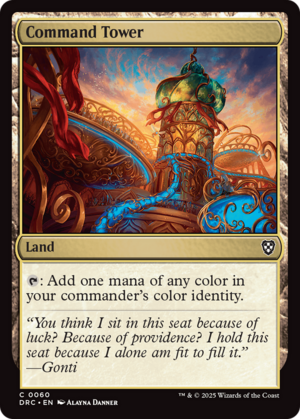
Card Details
Info
| Color: | |
| Identifies: | |
| Cost: | |
| Rarity: | Common |
| Converted Cost: | 0 |
| Power/Toughness: | / |
| Types: | |
| SubTypes: | |
| Languages: | 
          |
| Layout: | Normal |
| Rank: | |
| Saltiness: |
Rules
Text
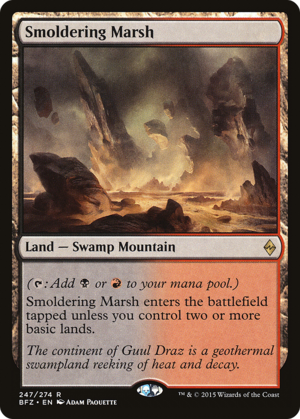
Card Details
Info
| Color: | |
| Identifies: | |
| Cost: | |
| Rarity: | Rare |
| Converted Cost: | 0 |
| Power/Toughness: | / |
| Types: | |
| SubTypes: | |
| Languages: | 
          |
| Layout: | Normal |
| Rank: | |
| Saltiness: |
Rules
Prices
Legalities
Standard
Standardbrawl
Vintage
Modern
Brawl
Historic
Duel
Alchemy
Predh
Oathbreaker
Commander
Pioneer
Oldschool
Timeless
Premodern
Penny
Pauper
Gladiator
Paupercommander
Future
Legacy
Text
(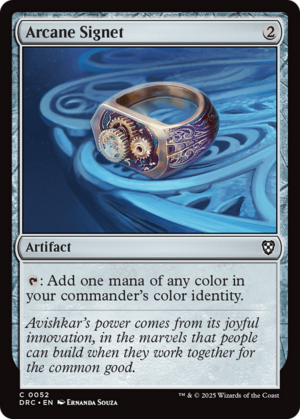
Card Details
Info
| Color: | |
| Identifies: | |
| Cost: |
|
| Rarity: | Common |
| Converted Cost: | 2 |
| Power/Toughness: | / |
| Types: | |
| SubTypes: | |
| Languages: | 
          |
| Layout: | Normal |
| Rank: | |
| Saltiness: |
Rules
Text
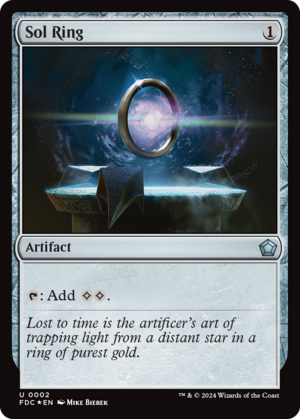
Card Details
Info
| Color: | |
| Identifies: | |
| Cost: |
|
| Rarity: | Uncommon |
| Converted Cost: | 1 |
| Power/Toughness: | / |
| Types: | |
| SubTypes: | |
| Languages: | 
         |
| Layout: | Normal |
| Rank: | |
| Saltiness: |
Rules
Text
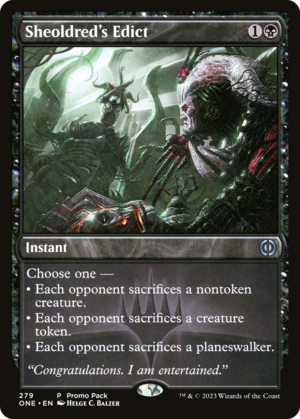
Card Details
Info
| Color: | |
| Identifies: | |
| Cost: |
|
| Rarity: | Uncommon |
| Converted Cost: | 2 |
| Power/Toughness: | / |
| Types: | |
| SubTypes: | |
| Languages: | 
       |
| Layout: | Normal |
| Rank: | |
| Saltiness: |
Rules
Prices
Legalities
Standard
Standardbrawl
Vintage
Modern
Brawl
Historic
Duel
Alchemy
Predh
Oathbreaker
Commander
Pioneer
Oldschool
Timeless
Premodern
Penny
Pauper
Gladiator
Paupercommander
Future
Legacy
Text
Choose one — • Each opponent sacrifices a nontoken creature of their choice. • Each opponent sacrifices a creature token of their choice. • Each opponent sacrifices a planeswalker of their choice.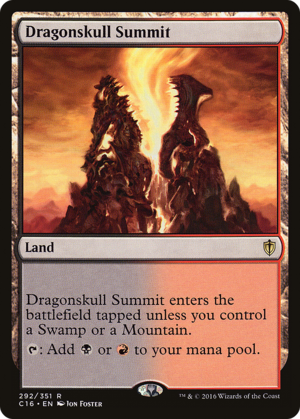
Card Details
Info
| Color: | |
| Identifies: | |
| Cost: | |
| Rarity: | Rare |
| Converted Cost: | 0 |
| Power/Toughness: | / |
| Types: | |
| SubTypes: | |
| Languages: | 
          |
| Layout: | Normal |
| Rank: | |
| Saltiness: |
Rules
Text
This land enters tapped unless you control a Swamp or a Mountain.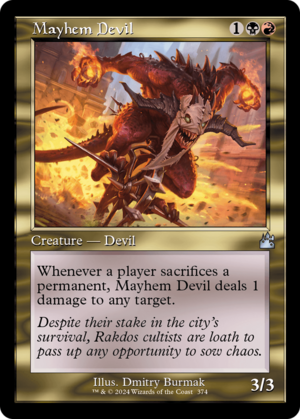
Card Details
Info
| Color: | |
| Identifies: | |
| Cost: |
|
| Rarity: | Uncommon |
| Converted Cost: | 3 |
| Power/Toughness: | 3/3 |
| Types: | |
| SubTypes: | |
| Languages: | 
          |
| Layout: | Normal |
| Rank: | |
| Saltiness: |
Rules
Prices
Legalities
Standard
Standardbrawl
Vintage
Modern
Brawl
Historic
Duel
Alchemy
Predh
Oathbreaker
Commander
Pioneer
Oldschool
Timeless
Premodern
Penny
Pauper
Gladiator
Paupercommander
Future
Legacy
Text
Whenever a player sacrifices a permanent, this creature deals 1 damage to any target.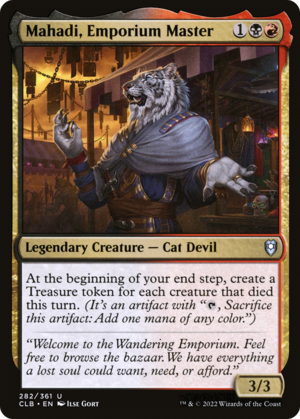
Card Details
Info
| Color: | |
| Identifies: | |
| Cost: |
|
| Rarity: | Uncommon |
| Converted Cost: | 3 |
| Power/Toughness: | 3/3 |
| Types: | |
| SubTypes: | |
| Languages: | 
          |
| Layout: | Normal |
| Rank: | |
| Saltiness: | |
| Tokens: |
Abilities/Keywords
Rules
Prices
Legalities
Standard
Standardbrawl
Vintage
Modern
Brawl
Historic
Duel
Alchemy
Predh
Oathbreaker
Commander
Pioneer
Oldschool
Timeless
Premodern
Penny
Pauper
Gladiator
Paupercommander
Future
Legacy
Text
At the beginning of your end step, create a Treasure token for each creature that died this turn. (It's an artifact with "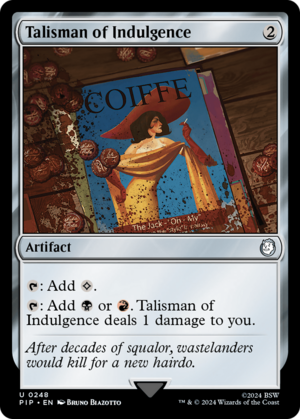
Card Details
Info
| Color: | |
| Identifies: | |
| Cost: |
|
| Rarity: | Uncommon |
| Converted Cost: | 2 |
| Power/Toughness: | / |
| Types: | |
| SubTypes: | |
| Languages: | 
         |
| Layout: | Normal |
| Rank: | |
| Saltiness: |
Rules
Prices
Legalities
Standard
Standardbrawl
Vintage
Modern
Brawl
Historic
Duel
Alchemy
Predh
Oathbreaker
Commander
Pioneer
Oldschool
Timeless
Premodern
Penny
Pauper
Gladiator
Paupercommander
Future
Legacy
Text
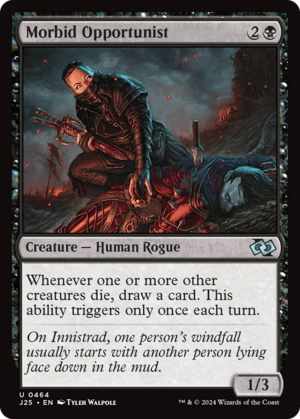
Card Details
Info
| Color: | |
| Identifies: | |
| Cost: |
|
| Rarity: | Uncommon |
| Converted Cost: | 3 |
| Power/Toughness: | 1/3 |
| Types: | |
| SubTypes: | |
| Languages: | 
          |
| Layout: | Normal |
| Rank: | |
| Saltiness: |
Rules
Text
Whenever one or more other creatures die, draw a card. This ability triggers only once each turn.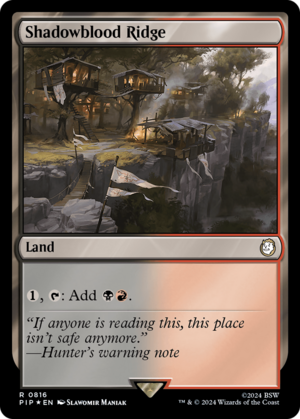
Card Details
Info
| Color: | |
| Identifies: | |
| Cost: | |
| Rarity: | Rare |
| Converted Cost: | 0 |
| Power/Toughness: | / |
| Types: | |
| SubTypes: | |
| Languages: | 
         |
| Layout: | Normal |
| Rank: | |
| Saltiness: |
Rules
Text
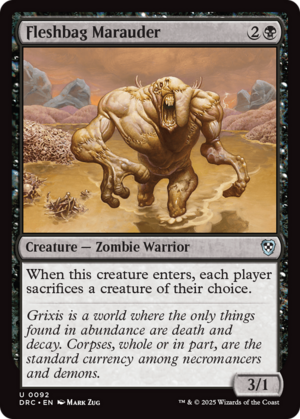
Card Details
Info
| Color: | |
| Identifies: | |
| Cost: |
|
| Rarity: | Uncommon |
| Converted Cost: | 3 |
| Power/Toughness: | 3/1 |
| Types: | |
| SubTypes: | |
| Languages: | 
          |
| Layout: | Normal |
| Rank: | |
| Saltiness: |
Rules
Text
When this creature enters, each player sacrifices a creature of their choice.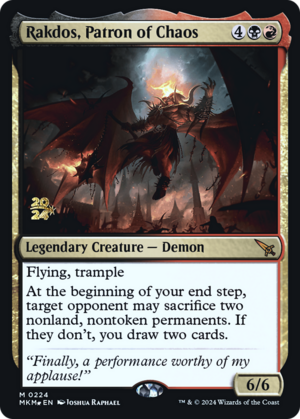
Card Details
Info
| Color: | |
| Identifies: | |
| Cost: |
|
| Rarity: | Mythic |
| Converted Cost: | 6 |
| Power/Toughness: | 6/6 |
| Types: | |
| SubTypes: | |
| Languages: | 
|
| Layout: | Normal |
| Rank: | |
| Saltiness: |
Abilities/Keywords
Rules
Text
Flying, trample At the beginning of your end step, target opponent maysacrificetwo nonland, nontoken permanents of their choice. If they don't, you draw two cards.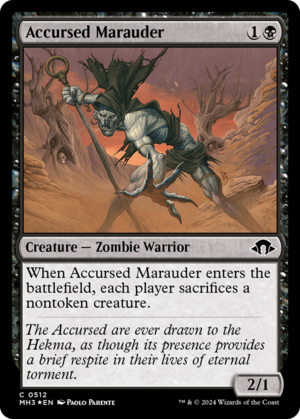
Card Details
Info
| Color: | |
| Identifies: | |
| Cost: |
|
| Rarity: | Common |
| Converted Cost: | 2 |
| Power/Toughness: | 2/1 |
| Types: | |
| SubTypes: | |
| Languages: | 
       |
| Layout: | Normal |
| Rank: | |
| Saltiness: |
Rules
Text
When this creature enters, each player sacrifices a nontoken creature of their choice.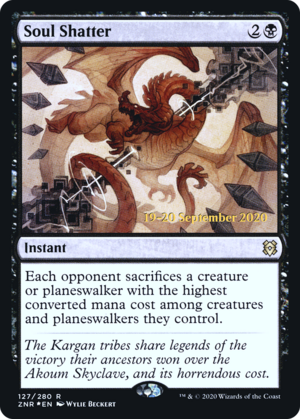
Card Details
Info
| Color: | |
| Identifies: | |
| Cost: |
|
| Rarity: | Rare |
| Converted Cost: | 3 |
| Power/Toughness: | / |
| Types: | |
| SubTypes: | |
| Languages: | 
   |
| Layout: | Normal |
| Rank: | |
| Saltiness: |
Rules
Prices
| Seller | Price |
|---|---|
| Cardkingdom | 10.99 USD |
| Manapool | 100.49 USD |
| Tcgplayer | 4.36 USD |
| Cardmarket | 3.2 EUR |
Legalities
Standard
Standardbrawl
Vintage
Modern
Brawl
Historic
Duel
Alchemy
Predh
Oathbreaker
Commander
Pioneer
Oldschool
Timeless
Premodern
Penny
Pauper
Gladiator
Paupercommander
Future
Legacy
Text
Each opponent sacrifices a creature or planeswalker with the greatest mana value among creatures and planeswalkers they control.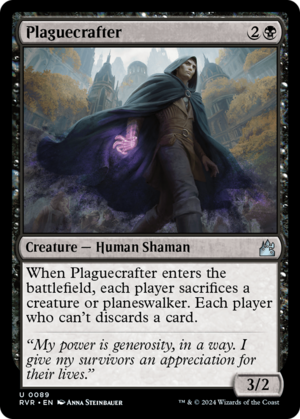
Card Details
Info
| Color: | |
| Identifies: | |
| Cost: |
|
| Rarity: | Uncommon |
| Converted Cost: | 3 |
| Power/Toughness: | 3/2 |
| Types: | |
| SubTypes: | |
| Languages: | 
          |
| Layout: | Normal |
| Rank: | |
| Saltiness: |
Rules
Prices
Legalities
Standard
Standardbrawl
Vintage
Modern
Brawl
Historic
Duel
Alchemy
Predh
Oathbreaker
Commander
Pioneer
Oldschool
Timeless
Premodern
Penny
Pauper
Gladiator
Paupercommander
Future
Legacy
Text
When this creature enters, each player sacrifices a creature or planeswalker of their choice. Each player who can't discards a card.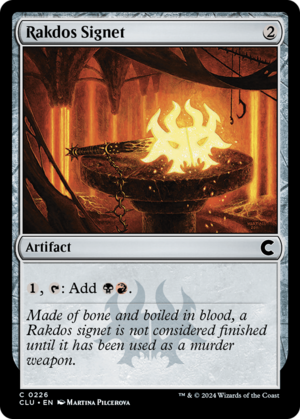
Card Details
Info
| Color: | |
| Identifies: | |
| Cost: |
|
| Rarity: | Common |
| Converted Cost: | 2 |
| Power/Toughness: | / |
| Types: | |
| SubTypes: | |
| Languages: | 
         |
| Layout: | Normal |
| Rank: | |
| Saltiness: |
Rules
Text
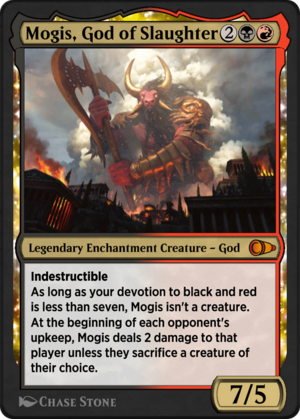
Card Details
Info
| Color: | |
| Identifies: | |
| Cost: |
|
| Rarity: | Mythic |
| Converted Cost: | 4 |
| Power/Toughness: | 7/5 |
| Types: | |
| SubTypes: | |
| Languages: | 
          |
| Layout: | Normal |
| Rank: | |
| Saltiness: |
Abilities/Keywords
Rules
Prices
| Seller | Price |
|---|
Legalities
Standard
Standardbrawl
Vintage
Modern
Brawl
Historic
Duel
Alchemy
Predh
Oathbreaker
Commander
Pioneer
Oldschool
Timeless
Premodern
Penny
Pauper
Gladiator
Paupercommander
Future
Legacy
Text
Indestructible As long as your devotion to black and red is less than seven, Mogis isn't a creature. At the beginning of each opponent's upkeep, Mogis deals 2 damage to that player unless theysacrificea creature of their choice.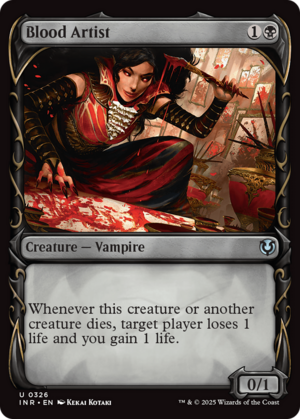
Card Details
Info
| Color: | |
| Identifies: | |
| Cost: |
|
| Rarity: | Uncommon |
| Converted Cost: | 2 |
| Power/Toughness: | 0/1 |
| Types: | |
| SubTypes: | |
| Languages: | 
          |
| Layout: | Normal |
| Rank: | |
| Saltiness: |
Rules
Prices
Legalities
Standard
Standardbrawl
Vintage
Modern
Brawl
Historic
Duel
Alchemy
Predh
Oathbreaker
Commander
Pioneer
Oldschool
Timeless
Premodern
Penny
Pauper
Gladiator
Paupercommander
Future
Legacy
Text
Whenever this creature or another creature dies, target player loses 1 life and you gain 1 life.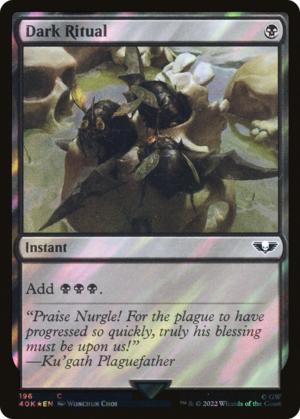
Card Details
Info
| Color: | |
| Identifies: | |
| Cost: |
|
| Rarity: | Common |
| Converted Cost: | 1 |
| Power/Toughness: | / |
| Types: | |
| SubTypes: | |
| Languages: | 
          |
| Layout: | Normal |
| Rank: | |
| Saltiness: |
Rules
Text
Add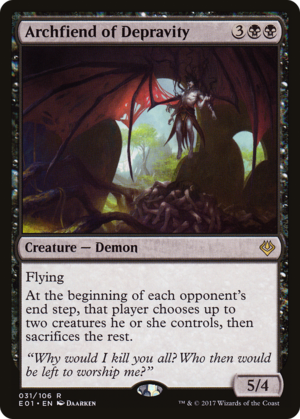
Card Details
Info
| Color: | |
| Identifies: | |
| Cost: |
|
| Rarity: | Rare |
| Converted Cost: | 5 |
| Power/Toughness: | 5/4 |
| Types: | |
| SubTypes: | |
| Languages: | 
          |
| Layout: | Normal |
| Rank: | |
| Saltiness: |
Abilities/Keywords
Rules
Text
Flying At the beginning of each opponent's end step, that player chooses up to two creatures they control, then sacrifices the rest.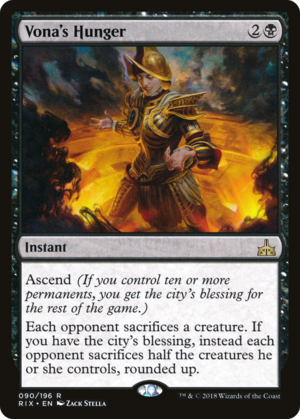
Card Details
Info
| Color: | |
| Identifies: | |
| Cost: |
|
| Rarity: | Rare |
| Converted Cost: | 3 |
| Power/Toughness: | / |
| Types: | |
| SubTypes: | |
| Languages: | 
          |
| Layout: | Normal |
| Rank: | |
| Saltiness: | |
| Tokens: |
Abilities/Keywords
Rules
Prices
Legalities
Standard
Standardbrawl
Vintage
Modern
Brawl
Historic
Duel
Alchemy
Predh
Oathbreaker
Commander
Pioneer
Oldschool
Timeless
Premodern
Penny
Pauper
Gladiator
Paupercommander
Future
Legacy
Text
Ascend (If you control ten or more permanents, you get the city's blessing for the rest of the game.) Each opponent sacrifices a creature of their choice. If you have the city's blessing, instead each opponent sacrifices half the creatures they control of their choice, rounded up.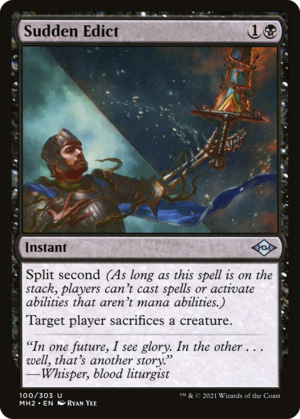
Card Details
Info
| Color: | |
| Identifies: | |
| Cost: |
|
| Rarity: | Uncommon |
| Converted Cost: | 2 |
| Power/Toughness: | / |
| Types: | |
| SubTypes: | |
| Languages: | 
          |
| Layout: | Normal |
| Rank: | |
| Saltiness: |
Abilities/Keywords
Rules
Prices
Legalities
Standard
Standardbrawl
Vintage
Modern
Brawl
Historic
Duel
Alchemy
Predh
Oathbreaker
Commander
Pioneer
Oldschool
Timeless
Premodern
Penny
Pauper
Gladiator
Paupercommander
Future
Legacy
Text
Split second (As long as this spell is on the stack, players can't cast spells or activate abilities that aren't mana abilities.) Target player sacrifices a creature of their choice.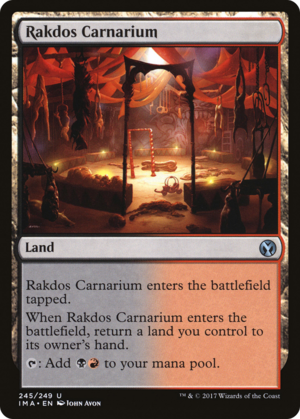
Card Details
Info
| Color: | |
| Identifies: | |
| Cost: | |
| Rarity: | Uncommon |
| Converted Cost: | 0 |
| Power/Toughness: | / |
| Types: | |
| SubTypes: | |
| Languages: | 
         |
| Layout: | Normal |
| Rank: | |
| Saltiness: |
Rules
Prices
Legalities
Standard
Standardbrawl
Vintage
Modern
Brawl
Historic
Duel
Alchemy
Predh
Oathbreaker
Commander
Pioneer
Oldschool
Timeless
Premodern
Penny
Pauper
Gladiator
Paupercommander
Future
Legacy
Text
This land enters tapped. When this land enters, return a land you control to its owner's hand.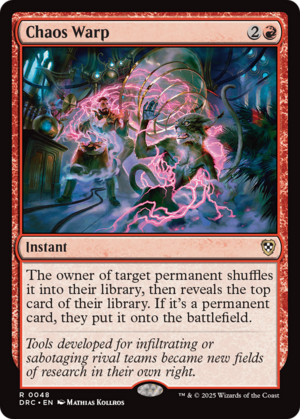
Card Details
Info
| Color: | |
| Identifies: | |
| Cost: |
|
| Rarity: | Rare |
| Converted Cost: | 3 |
| Power/Toughness: | / |
| Types: | |
| SubTypes: | |
| Languages: | 
         |
| Layout: | Normal |
| Rank: | |
| Saltiness: |
Rules
Text
The owner of target permanent shuffles it into their library, then reveals the top card of their library. If it's a permanent card, they put it onto the battlefield.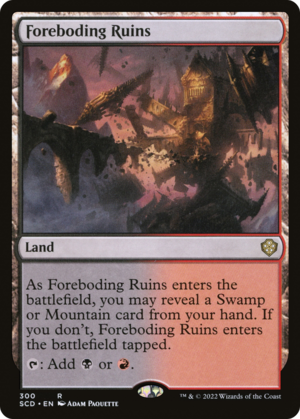
Card Details
Info
| Color: | |
| Identifies: | |
| Cost: | |
| Rarity: | Rare |
| Converted Cost: | 0 |
| Power/Toughness: | / |
| Types: | |
| SubTypes: | |
| Languages: | 
          |
| Layout: | Normal |
| Rank: | |
| Saltiness: |
Rules
Text
As this land enters, you may reveal a Swamp or Mountain card from your hand. If you don't, this land enters tapped.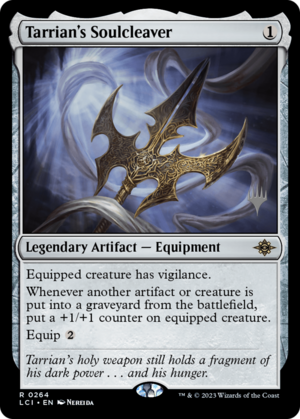
Card Details
Info
| Color: | |
| Identifies: | |
| Cost: |
|
| Rarity: | Rare |
| Converted Cost: | 1 |
| Power/Toughness: | / |
| Types: | |
| SubTypes: | |
| Languages: | 
    |
| Layout: | Normal |
| Rank: | |
| Saltiness: |
Abilities/Keywords
Rules
Prices
Legalities
Standard
Standardbrawl
Vintage
Modern
Brawl
Historic
Duel
Alchemy
Predh
Oathbreaker
Commander
Pioneer
Oldschool
Timeless
Premodern
Penny
Pauper
Gladiator
Paupercommander
Future
Legacy
Text
Equipped creature has vigilance. Whenever another artifact or creature is put into a graveyard from the battlefield, put a +1/+1counteron equipped creature. Equip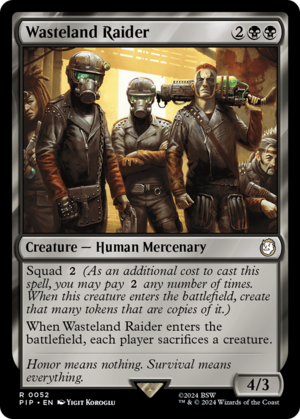
Card Details
Info
| Color: | |
| Identifies: | |
| Cost: |
|
| Rarity: | Rare |
| Converted Cost: | 4 |
| Power/Toughness: | 4/3 |
| Types: | |
| SubTypes: | |
| Languages: | 
      |
| Layout: | Normal |
| Rank: | |
| Saltiness: | |
| Tokens: |
Abilities/Keywords
Rules
Prices
Legalities
Standard
Standardbrawl
Vintage
Modern
Brawl
Historic
Duel
Alchemy
Predh
Oathbreaker
Commander
Pioneer
Oldschool
Timeless
Premodern
Penny
Pauper
Gladiator
Paupercommander
Future
Legacy
Text
Squad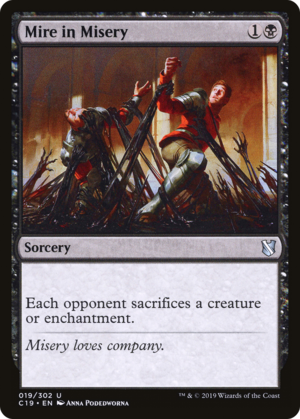
Card Details
Info
| Color: | |
| Identifies: | |
| Cost: |
|
| Rarity: | Uncommon |
| Converted Cost: | 2 |
| Power/Toughness: | / |
| Types: | |
| SubTypes: | |
| Languages: | 
       |
| Layout: | Normal |
| Rank: | |
| Saltiness: |
Rules
Prices
Legalities
Standard
Standardbrawl
Vintage
Modern
Brawl
Historic
Duel
Alchemy
Predh
Oathbreaker
Commander
Pioneer
Oldschool
Timeless
Premodern
Penny
Pauper
Gladiator
Paupercommander
Future
Legacy
Text
Each opponent sacrifices a creature or enchantment of their choice.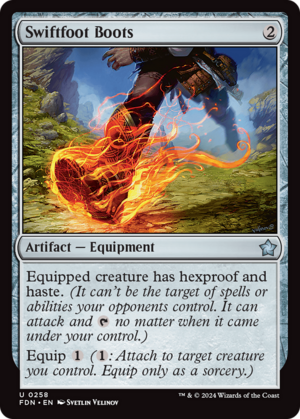
Card Details
Info
| Color: | |
| Identifies: | |
| Cost: |
|
| Rarity: | Uncommon |
| Converted Cost: | 2 |
| Power/Toughness: | / |
| Types: | |
| SubTypes: | |
| Languages: | 
          |
| Layout: | Normal |
| Rank: | |
| Saltiness: |
Abilities/Keywords
Rules
Prices
Legalities
Standard
Standardbrawl
Vintage
Modern
Brawl
Historic
Duel
Alchemy
Predh
Oathbreaker
Commander
Pioneer
Oldschool
Timeless
Premodern
Penny
Pauper
Gladiator
Paupercommander
Future
Legacy
Text
Equipped creature has hexproof and haste. (It can't be the target of spells or abilities your opponents control. It can attack and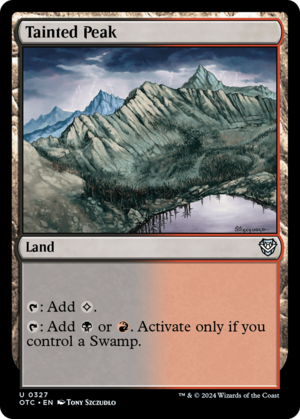
Card Details
Info
| Color: | |
| Identifies: | |
| Cost: | |
| Rarity: | Uncommon |
| Converted Cost: | 0 |
| Power/Toughness: | / |
| Types: | |
| SubTypes: | |
| Languages: | 
         |
| Layout: | Normal |
| Rank: | |
| Saltiness: |
Rules
Text
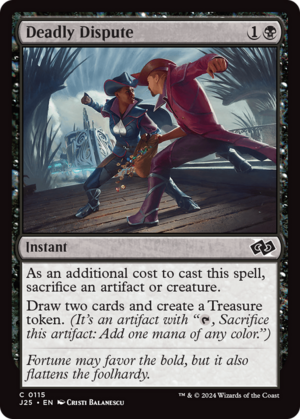
Card Details
Info
| Color: | |
| Identifies: | |
| Cost: |
|
| Rarity: | Common |
| Converted Cost: | 2 |
| Power/Toughness: | / |
| Types: | |
| SubTypes: | |
| Languages: | 
          |
| Layout: | Normal |
| Rank: | |
| Saltiness: | |
| Tokens: |
Abilities/Keywords
Rules
Text
As an additional cost to cast this spell,sacrificean artifact or creature. Draw two cards and create a Treasure token. (It's an artifact with "Less Synergy
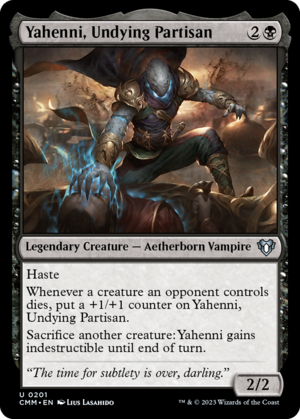
Card Details
Info
| Color: | |
| Identifies: | |
| Cost: |
|
| Rarity: | Uncommon |
| Converted Cost: | 3 |
| Power/Toughness: | 2/2 |
| Types: | |
| SubTypes: | |
| Languages: | 
          |
| Layout: | Normal |
| Rank: | |
| Saltiness: |
Abilities/Keywords
Rules
Prices
Legalities
Standard
Standardbrawl
Vintage
Modern
Brawl
Historic
Duel
Alchemy
Predh
Oathbreaker
Commander
Pioneer
Oldschool
Timeless
Premodern
Penny
Pauper
Gladiator
Paupercommander
Future
Legacy
Text
Haste Whenever a creature an opponent controls dies, put a +1/+1counteron Yahenni. Sacrifice another creature: Yahenni gains indestructible until end of turn.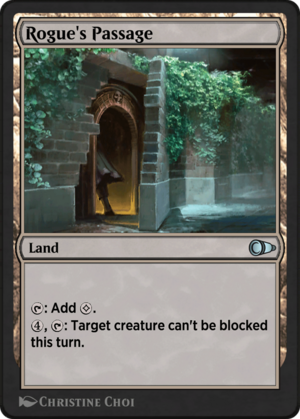
Card Details
Info
| Color: | |
| Identifies: | |
| Cost: | |
| Rarity: | Uncommon |
| Converted Cost: | 0 |
| Power/Toughness: | / |
| Types: | |
| SubTypes: | |
| Languages: | 
          |
| Layout: | Normal |
| Rank: | |
| Saltiness: |
Rules
Prices
| Seller | Price |
|---|
Legalities
Standard
Standardbrawl
Vintage
Modern
Brawl
Historic
Duel
Alchemy
Predh
Oathbreaker
Commander
Pioneer
Oldschool
Timeless
Premodern
Penny
Pauper
Gladiator
Paupercommander
Future
Legacy
Text
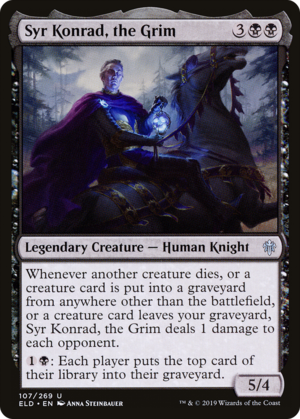
Card Details
Info
| Color: | |
| Identifies: | |
| Cost: |
|
| Rarity: | Uncommon |
| Converted Cost: | 5 |
| Power/Toughness: | 5/4 |
| Types: | |
| SubTypes: | |
| Languages: | 
          |
| Layout: | Normal |
| Rank: | |
| Saltiness: |
Abilities/Keywords
Rules
Prices
Legalities
Standard
Standardbrawl
Vintage
Modern
Brawl
Historic
Duel
Alchemy
Predh
Oathbreaker
Commander
Pioneer
Oldschool
Timeless
Premodern
Penny
Pauper
Gladiator
Paupercommander
Future
Legacy
Text
Whenever another creature dies, or a creature card is put into a graveyard from anywhere other than the battlefield, or a creature card leaves your graveyard, Syr Konrad deals 1 damage to each opponent.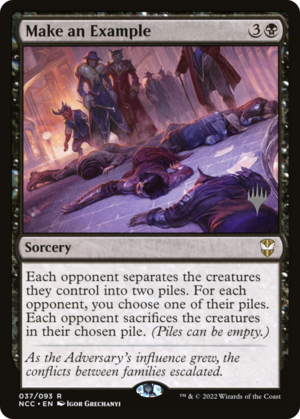
Card Details
Info
| Color: | |
| Identifies: | |
| Cost: |
|
| Rarity: | Rare |
| Converted Cost: | 4 |
| Power/Toughness: | / |
| Types: | |
| SubTypes: | |
| Languages: | 
         |
| Layout: | Normal |
| Rank: | |
| Saltiness: |
Rules
Text
Each opponent separates the creatures they control into two piles. For each opponent, you choose one of their piles. Each opponent sacrifices the creatures in their chosen pile. (Piles can be empty.)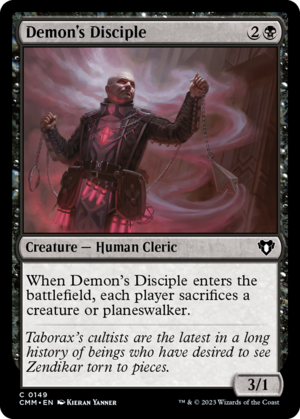
Card Details
Info
| Color: | |
| Identifies: | |
| Cost: |
|
| Rarity: | Common |
| Converted Cost: | 3 |
| Power/Toughness: | 3/1 |
| Types: | |
| SubTypes: | |
| Languages: | 
          |
| Layout: | Normal |
| Rank: | |
| Saltiness: |
Rules
Prices
Legalities
Standard
Standardbrawl
Vintage
Modern
Brawl
Historic
Duel
Alchemy
Predh
Oathbreaker
Commander
Pioneer
Oldschool
Timeless
Premodern
Penny
Pauper
Gladiator
Paupercommander
Future
Legacy
Text
When this creature enters, each player sacrifices a creature or planeswalker of their choice.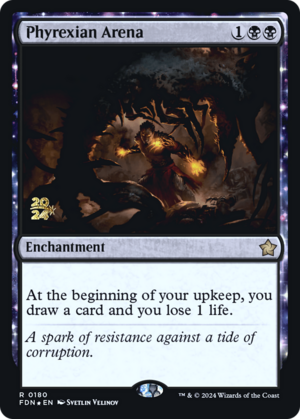
Card Details
Info
| Color: | |
| Identifies: | |
| Cost: |
|
| Rarity: | Rare |
| Converted Cost: | 3 |
| Power/Toughness: | / |
| Types: | |
| SubTypes: | |
| Languages: | 
        |
| Layout: | Normal |
| Rank: | |
| Saltiness: |
Rules
Text
At the beginning of your upkeep, you draw a card and you lose 1 life.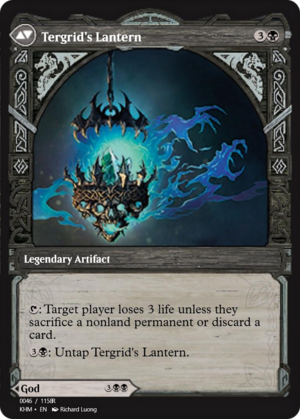
Card Details
Tergrid, God of Fright (Tergrid, God of Fright // Tergrid's Lantern) #88290 Legendary Creature — God
Info
| Color: | |
| Identifies: | |
| Cost: |
|
| Rarity: | Rare |
| Converted Cost: | 5 |
| Power/Toughness: | 4/5 |
| Types: | |
| SubTypes: | |
| Languages: | 
|
| EDH Bracket Attr: | Game Changer |
| Layout: | Modal Dfc |
| Rank: | |
| Saltiness: |
Abilities/Keywords
Rules
Prices
| Seller | Price |
|---|
Legalities
Standard
Standardbrawl
Vintage
Modern
Brawl
Historic
Duel
Alchemy
Predh
Oathbreaker
Commander
Pioneer
Oldschool
Timeless
Premodern
Penny
Pauper
Gladiator
Paupercommander
Future
Legacy
Text
Menace Whenever an opponent sacrifices a nontoken permanent or discards a permanent card, you may put that card from a graveyard onto the battlefield under your control.Info
| Color: | |
| Identifies: | |
| Cost: |
|
| Rarity: | Rare |
| Converted Cost: | 4 |
| Power/Toughness: | / |
| Types: | |
| SubTypes: | |
| Languages: | 
|
| EDH Bracket Attr: | Game Changer |
| Layout: | Modal Dfc |
| Rank: | |
| Saltiness: |
Abilities/Keywords
Rules
Prices
| Seller | Price |
|---|
Legalities
Standard
Standardbrawl
Vintage
Modern
Brawl
Historic
Duel
Alchemy
Predh
Oathbreaker
Commander
Pioneer
Oldschool
Timeless
Premodern
Penny
Pauper
Gladiator
Paupercommander
Future
Legacy
Text
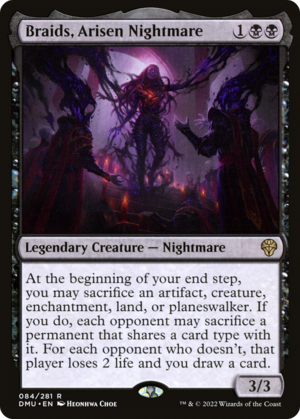
Card Details
Info
| Color: | |
| Identifies: | |
| Cost: |
|
| Rarity: | Rare |
| Converted Cost: | 3 |
| Power/Toughness: | 3/3 |
| Types: | |
| SubTypes: | |
| Languages: | 
       |
| Layout: | Normal |
| Rank: | |
| Saltiness: |
Rules
Prices
Legalities
Standard
Standardbrawl
Vintage
Modern
Brawl
Historic
Duel
Alchemy
Predh
Oathbreaker
Commander
Pioneer
Oldschool
Timeless
Premodern
Penny
Pauper
Gladiator
Paupercommander
Future
Legacy
Text
At the beginning of your end step, you maysacrificean artifact, creature, enchantment, land, or planeswalker. If you do, each opponent maysacrificea permanent of their choice that shares a card type with it. For each opponent who doesn't, that player loses 2 life and you draw a card.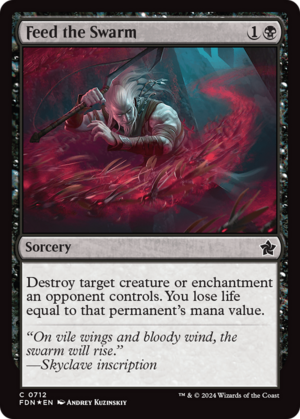
Card Details
Info
| Color: | |
| Identifies: | |
| Cost: |
|
| Rarity: | Common |
| Converted Cost: | 2 |
| Power/Toughness: | / |
| Types: | |
| SubTypes: | |
| Languages: | 
          |
| Layout: | Normal |
| Rank: | |
| Saltiness: |
Rules
Text
Destroy target creature or enchantment an opponent controls. You lose life equal to that permanent's mana value.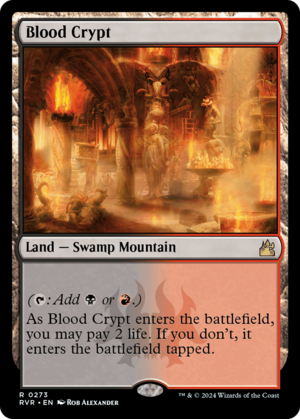
Card Details
Info
| Color: | |
| Identifies: | |
| Cost: | |
| Rarity: | Rare |
| Converted Cost: | 0 |
| Power/Toughness: | / |
| Types: | |
| SubTypes: | |
| Languages: | 
          |
| Layout: | Normal |
| Rank: | |
| Saltiness: |
Rules
Prices
Legalities
Standard
Standardbrawl
Vintage
Modern
Brawl
Historic
Duel
Alchemy
Predh
Oathbreaker
Commander
Pioneer
Oldschool
Timeless
Premodern
Penny
Pauper
Gladiator
Paupercommander
Future
Legacy
Text
(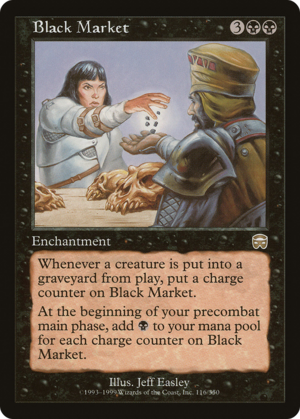
Card Details
Info
| Color: | |
| Identifies: | |
| Cost: |
|
| Rarity: | Rare |
| Converted Cost: | 5 |
| Power/Toughness: | / |
| Types: | |
| SubTypes: | |
| Languages: | 
         |
| Layout: | Normal |
| Rank: | |
| Saltiness: |
Rules
Prices
Legalities
Standard
Standardbrawl
Vintage
Modern
Brawl
Historic
Duel
Alchemy
Predh
Oathbreaker
Commander
Pioneer
Oldschool
Timeless
Premodern
Penny
Pauper
Gladiator
Paupercommander
Future
Legacy
Text
Whenever a creature dies, put a chargecounteron this enchantment. At the beginning of your first main phase, add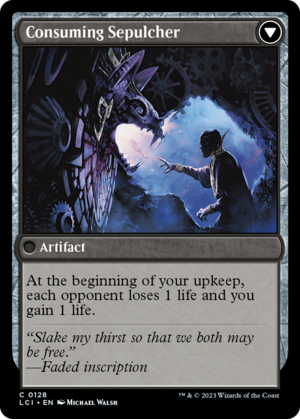
Card Details
- Card Faces:
- Tithing Blade (Front)
- Consuming Sepulcher (Back)
Info
| Color: | |
| Identifies: | |
| Cost: |
|
| Rarity: | Common |
| Converted Cost: | 2 |
| Power/Toughness: | / |
| Types: | |
| SubTypes: | |
| Languages: | 
       |
| Layout: | Transform |
| Rank: | |
| Saltiness: |
Abilities/Keywords
Rules
Prices
Legalities
Standard
Standardbrawl
Vintage
Modern
Brawl
Historic
Duel
Alchemy
Predh
Oathbreaker
Commander
Pioneer
Oldschool
Timeless
Premodern
Penny
Pauper
Gladiator
Paupercommander
Future
Legacy
Text
When this artifact enters, each opponent sacrifices a creature of their choice. Craft with creatureInfo
| Color: | |
| Identifies: | |
| Cost: | |
| Rarity: | Common |
| Converted Cost: | 2 |
| Power/Toughness: | / |
| Types: | |
| SubTypes: | |
| Languages: | 
       |
| Layout: | Transform |
| Rank: | |
| Saltiness: |
Abilities/Keywords
Rules
Prices
Legalities
Standard
Standardbrawl
Vintage
Modern
Brawl
Historic
Duel
Alchemy
Predh
Oathbreaker
Commander
Pioneer
Oldschool
Timeless
Premodern
Penny
Pauper
Gladiator
Paupercommander
Future
Legacy
Text
At the beginning of your upkeep, each opponent loses 1 life and you gain 1 life.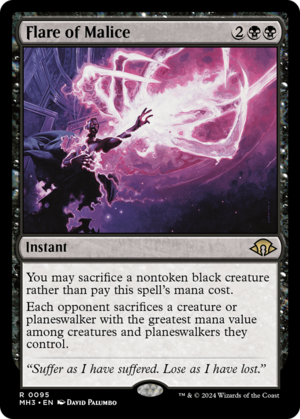
Card Details
Info
| Color: | |
| Identifies: | |
| Cost: |
|
| Rarity: | Rare |
| Converted Cost: | 4 |
| Power/Toughness: | / |
| Types: | |
| SubTypes: | |
| Languages: | 
       |
| Layout: | Normal |
| Rank: | |
| Saltiness: |
Rules
Prices
Legalities
Standard
Standardbrawl
Vintage
Modern
Brawl
Historic
Duel
Alchemy
Predh
Oathbreaker
Commander
Pioneer
Oldschool
Timeless
Premodern
Penny
Pauper
Gladiator
Paupercommander
Future
Legacy
Text
You maysacrificea nontoken black creature rather than pay this spell's mana cost. Each opponent sacrifices a creature or planeswalker with the greatest mana value among creatures and planeswalkers they control.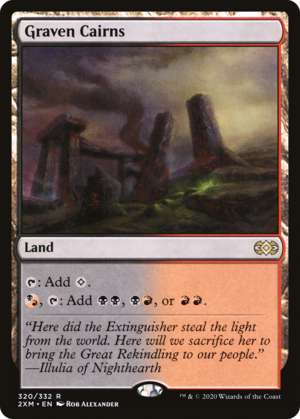
Card Details
Info
| Color: | |
| Identifies: | |
| Cost: | |
| Rarity: | Rare |
| Converted Cost: | 0 |
| Power/Toughness: | / |
| Types: | |
| SubTypes: | |
| Languages: | 
        |
| Layout: | Normal |
| Rank: | |
| Saltiness: |
Rules
Prices
Legalities
Standard
Standardbrawl
Vintage
Modern
Brawl
Historic
Duel
Alchemy
Predh
Oathbreaker
Commander
Pioneer
Oldschool
Timeless
Premodern
Penny
Pauper
Gladiator
Paupercommander
Future
Legacy
Text
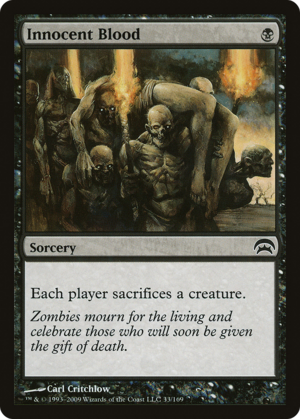
Card Details
Info
| Color: | |
| Identifies: | |
| Cost: |
|
| Rarity: | Common |
| Converted Cost: | 1 |
| Power/Toughness: | / |
| Types: | |
| SubTypes: | |
| Languages: | 
       |
| Layout: | Normal |
| Rank: | |
| Saltiness: |
Rules
Text
Each player sacrifices a creature of their choice.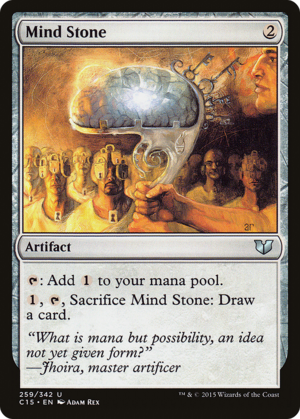
Card Details
Info
| Color: | |
| Identifies: | |
| Cost: |
|
| Rarity: | Uncommon |
| Converted Cost: | 2 |
| Power/Toughness: | / |
| Types: | |
| SubTypes: | |
| Languages: | 
          |
| Layout: | Normal |
| Rank: | |
| Saltiness: |
Rules
Prices
Legalities
Standard
Standardbrawl
Vintage
Modern
Brawl
Historic
Duel
Alchemy
Predh
Oathbreaker
Commander
Pioneer
Oldschool
Timeless
Premodern
Penny
Pauper
Gladiator
Paupercommander
Future
Legacy
Text
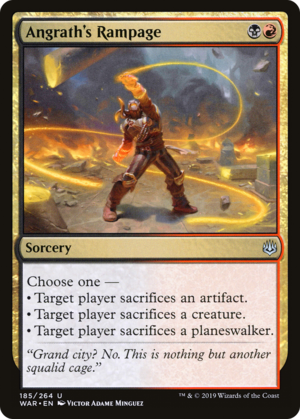
Card Details
Info
| Color: | |
| Identifies: | |
| Cost: |
|
| Rarity: | Uncommon |
| Converted Cost: | 2 |
| Power/Toughness: | / |
| Types: | |
| SubTypes: | |
| Languages: | 
          |
| Layout: | Normal |
| Rank: | |
| Saltiness: |
Rules
Prices
Legalities
Standard
Standardbrawl
Vintage
Modern
Brawl
Historic
Duel
Alchemy
Predh
Oathbreaker
Commander
Pioneer
Oldschool
Timeless
Premodern
Penny
Pauper
Gladiator
Paupercommander
Future
Legacy
Text
Choose one — • Target player sacrifices an artifact of their choice. • Target player sacrifices a creature of their choice. • Target player sacrifices a planeswalker of their choice.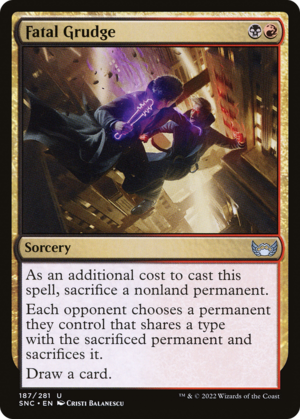
Card Details
Info
| Color: | |
| Identifies: | |
| Cost: |
|
| Rarity: | Uncommon |
| Converted Cost: | 2 |
| Power/Toughness: | / |
| Types: | |
| SubTypes: | |
| Languages: | 
          |
| Layout: | Normal |
| Rank: | |
| Saltiness: |
Rules
Prices
Legalities
Standard
Standardbrawl
Vintage
Modern
Brawl
Historic
Duel
Alchemy
Predh
Oathbreaker
Commander
Pioneer
Oldschool
Timeless
Premodern
Penny
Pauper
Gladiator
Paupercommander
Future
Legacy
Text
As an additional cost to cast this spell,sacrificea nonland permanent. Each opponent chooses a permanent they control that shares a card type with the sacrificed permanent and sacrifices it. Draw a card.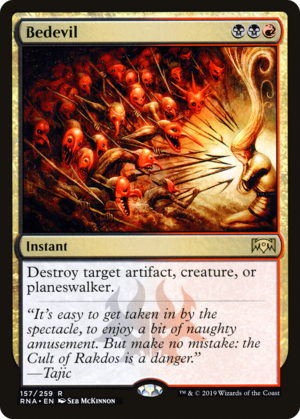
Card Details
Info
| Color: | |
| Identifies: | |
| Cost: |
|
| Rarity: | Rare |
| Converted Cost: | 3 |
| Power/Toughness: | / |
| Types: | |
| SubTypes: | |
| Languages: | 
          |
| Layout: | Normal |
| Rank: | |
| Saltiness: |
Rules
Prices
Legalities
Standard
Standardbrawl
Vintage
Modern
Brawl
Historic
Duel
Alchemy
Predh
Oathbreaker
Commander
Pioneer
Oldschool
Timeless
Premodern
Penny
Pauper
Gladiator
Paupercommander
Future
Legacy
Text
Destroy target artifact, creature, or planeswalker.
Card Details
Info
| Color: | |
| Identifies: | |
| Cost: |
|
| Rarity: | Common |
| Converted Cost: | 2 |
| Power/Toughness: | / |
| Types: | |
| SubTypes: | |
| Languages: | 
          |
| Layout: | Normal |
| Rank: | |
| Saltiness: |
Rules
Prices
Legalities
Standard
Standardbrawl
Vintage
Modern
Brawl
Historic
Duel
Alchemy
Predh
Oathbreaker
Commander
Pioneer
Oldschool
Timeless
Premodern
Penny
Pauper
Gladiator
Paupercommander
Future
Legacy
Text
Target player sacrifices a creature of their choice.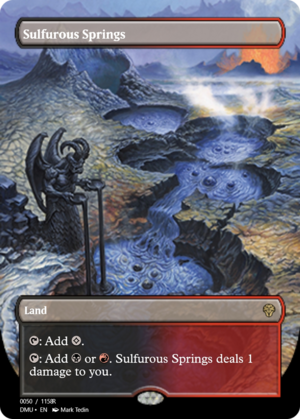
Card Details
Info
| Color: | |
| Identifies: | |
| Cost: | |
| Rarity: | Rare |
| Converted Cost: | 0 |
| Power/Toughness: | / |
| Types: | |
| SubTypes: | |
| Languages: | 
        |
| Layout: | Normal |
| Rank: | |
| Saltiness: |
Rules
Prices
| Seller | Price |
|---|
Legalities
Standard
Standardbrawl
Vintage
Modern
Brawl
Historic
Duel
Alchemy
Predh
Oathbreaker
Commander
Pioneer
Oldschool
Timeless
Premodern
Penny
Pauper
Gladiator
Paupercommander
Future
Legacy
Text
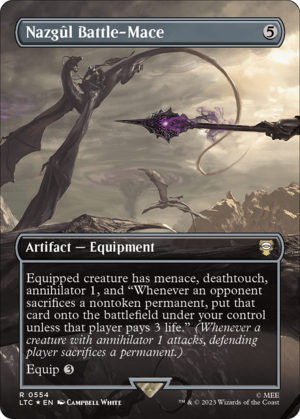
Card Details
Info
| Color: | |
| Identifies: | |
| Cost: |
|
| Rarity: | Rare |
| Converted Cost: | 5 |
| Power/Toughness: | / |
| Types: | |
| SubTypes: | |
| Languages: | 
|
| Layout: | Normal |
| Rank: | |
| Saltiness: |
Abilities/Keywords
Rules
Text
Equipped creature has menace, deathtouch, annihilator 1, and "Whenever an opponent sacrifices a nontoken permanent, put that card onto the battlefield under your control unless that player pays 3 life." (Whenever a creature with annihilator 1 attacks, defending player sacrifices a permanent of their choice.) Equip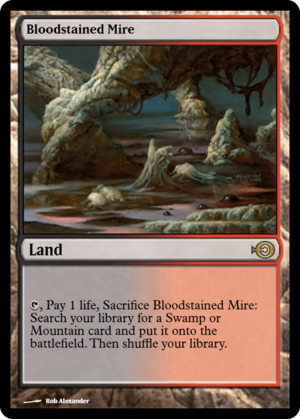
Card Details
Info
| Color: | |
| Identifies: | |
| Cost: | |
| Rarity: | Rare |
| Converted Cost: | 0 |
| Power/Toughness: | / |
| Types: | |
| SubTypes: | |
| Languages: | 
          |
| Layout: | Normal |
| Rank: | |
| Saltiness: |
Rules
Prices
| Seller | Price |
|---|
Legalities
Standard
Standardbrawl
Vintage
Modern
Brawl
Historic
Duel
Alchemy
Predh
Oathbreaker
Commander
Pioneer
Oldschool
Timeless
Premodern
Penny
Pauper
Gladiator
Paupercommander
Future
Legacy
Text
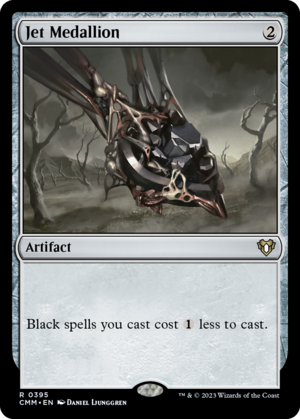
Card Details
Info
| Color: | |
| Identifies: | |
| Cost: |
|
| Rarity: | Rare |
| Converted Cost: | 2 |
| Power/Toughness: | / |
| Types: | |
| SubTypes: | |
| Languages: | 
       |
| Layout: | Normal |
| Rank: | |
| Saltiness: |
Rules
Prices
Legalities
Standard
Standardbrawl
Vintage
Modern
Brawl
Historic
Duel
Alchemy
Predh
Oathbreaker
Commander
Pioneer
Oldschool
Timeless
Premodern
Penny
Pauper
Gladiator
Paupercommander
Future
Legacy
Text
Black spells you cast cost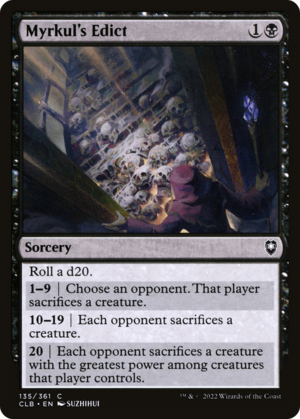
Card Details
Info
| Color: | |
| Identifies: | |
| Cost: |
|
| Rarity: | Common |
| Converted Cost: | 2 |
| Power/Toughness: | / |
| Types: | |
| SubTypes: | |
| Languages: | 
          |
| Layout: | Normal |
| Rank: | |
| Saltiness: |
Rules
Prices
Legalities
Standard
Standardbrawl
Vintage
Modern
Brawl
Historic
Duel
Alchemy
Predh
Oathbreaker
Commander
Pioneer
Oldschool
Timeless
Premodern
Penny
Pauper
Gladiator
Paupercommander
Future
Legacy
Text
Roll a d20. 1—9 | Choose an opponent. That player sacrifices a creature of their choice. 10—19 | Each opponent sacrifices a creature of their choice. 20 | Each opponent sacrifices a creature with the greatest power among creatures that player controls.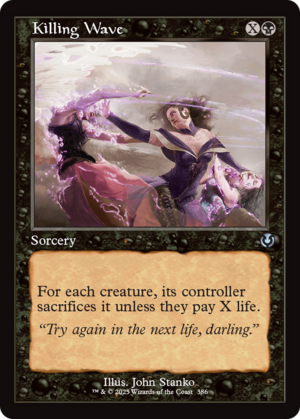
Card Details
Info
| Color: | |
| Identifies: | |
| Cost: |
|
| Rarity: | Uncommon |
| Converted Cost: | 1 |
| Power/Toughness: | / |
| Types: | |
| SubTypes: | |
| Languages: | 
          |
| Layout: | Normal |
| Rank: | |
| Saltiness: |
Rules
Prices
Legalities
Standard
Standardbrawl
Vintage
Modern
Brawl
Historic
Duel
Alchemy
Predh
Oathbreaker
Commander
Pioneer
Oldschool
Timeless
Premodern
Penny
Pauper
Gladiator
Paupercommander
Future
Legacy
Text
For each creature, its controller sacrifices it unless they pay X life.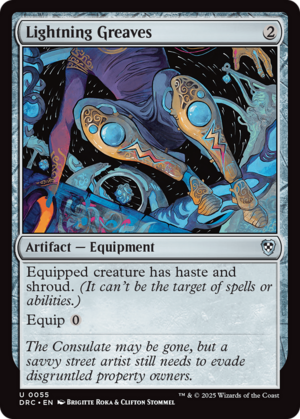
Card Details
Info
| Color: | |
| Identifies: | |
| Cost: |
|
| Rarity: | Uncommon |
| Converted Cost: | 2 |
| Power/Toughness: | / |
| Types: | |
| SubTypes: | |
| Languages: | 
         |
| Layout: | Normal |
| Rank: | |
| Saltiness: |
Abilities/Keywords
Rules
Text
Equipped creature has haste and shroud. (It can't be the target of spells or abilities.) Equip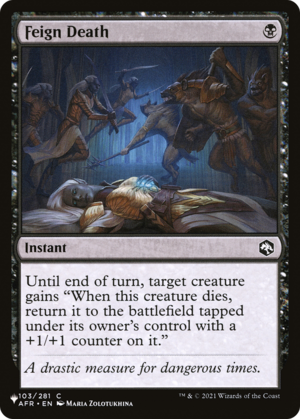
Card Details
Info
| Color: | |
| Identifies: | |
| Cost: |
|
| Rarity: | Common |
| Converted Cost: | 1 |
| Power/Toughness: | / |
| Types: | |
| SubTypes: | |
| Languages: | 
          |
| Layout: | Normal |
| Rank: | |
| Saltiness: |
Rules
Text
Until end of turn, target creature gains "When this creature dies, return it to the battlefield tapped under its owner's control with a +1/+1counteron it."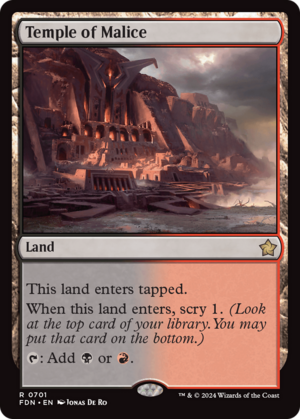
Card Details
Info
| Color: | |
| Identifies: | |
| Cost: | |
| Rarity: | Rare |
| Converted Cost: | 0 |
| Power/Toughness: | / |
| Types: | |
| SubTypes: | |
| Languages: | 
          |
| Layout: | Normal |
| Rank: | |
| Saltiness: |
Abilities/Keywords
Rules
Text
This land enters tapped. When this land enters, scry 1. (Look at the top card of your library. You may put that card on the bottom.)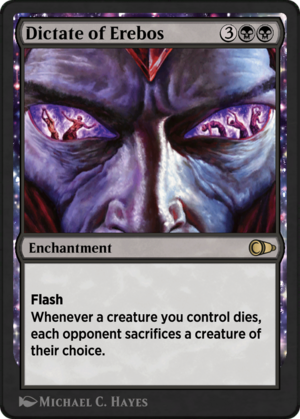
Card Details
Info
| Color: | |
| Identifies: | |
| Cost: |
|
| Rarity: | Rare |
| Converted Cost: | 5 |
| Power/Toughness: | / |
| Types: | |
| SubTypes: | |
| Languages: | 
          |
| Layout: | Normal |
| Rank: | |
| Saltiness: |
Abilities/Keywords
Rules
Prices
| Seller | Price |
|---|
Legalities
Standard
Standardbrawl
Vintage
Modern
Brawl
Historic
Duel
Alchemy
Predh
Oathbreaker
Commander
Pioneer
Oldschool
Timeless
Premodern
Penny
Pauper
Gladiator
Paupercommander
Future
Legacy
Text
Flash Whenever a creature you control dies, each opponent sacrifices a creature of their choice.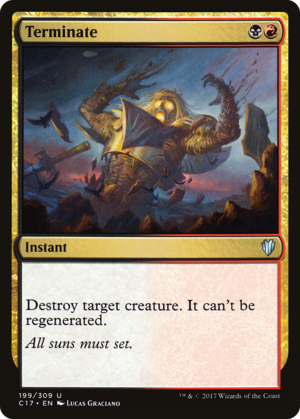
Card Details
Info
| Color: | |
| Identifies: | |
| Cost: |
|
| Rarity: | Uncommon |
| Converted Cost: | 2 |
| Power/Toughness: | / |
| Types: | |
| SubTypes: | |
| Languages: | 
         |
| Layout: | Normal |
| Rank: | |
| Saltiness: |
Rules
Text
Destroy target creature. It can't be regenerated.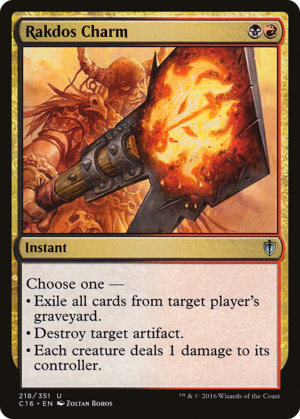
Card Details
Info
| Color: | |
| Identifies: | |
| Cost: |
|
| Rarity: | Uncommon |
| Converted Cost: | 2 |
| Power/Toughness: | / |
| Types: | |
| SubTypes: | |
| Languages: | 
          |
| Layout: | Normal |
| Rank: | |
| Saltiness: |
Rules
Text
Choose one — • Exile target player's graveyard. •Destroytarget artifact. • Each creature deals 1 damage to its controller.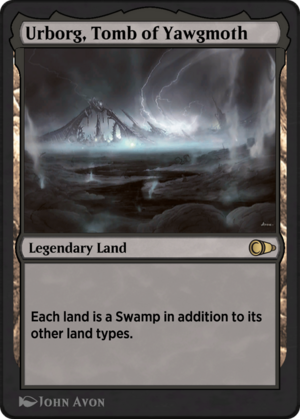
Card Details
Info
| Color: | |
| Identifies: | |
| Cost: | |
| Rarity: | Rare |
| Converted Cost: | 0 |
| Power/Toughness: | / |
| Types: | |
| SubTypes: | |
| Languages: | 
          |
| Layout: | Normal |
| Rank: | |
| Saltiness: |
Rules
Prices
| Seller | Price |
|---|
Legalities
Standard
Standardbrawl
Vintage
Modern
Brawl
Historic
Duel
Alchemy
Predh
Oathbreaker
Commander
Pioneer
Oldschool
Timeless
Premodern
Penny
Pauper
Gladiator
Paupercommander
Future
Legacy
Text
Each land is a Swamp in addition to its other land types.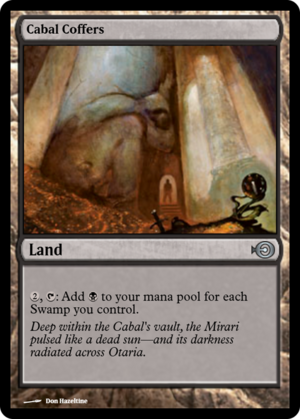
Card Details
Info
| Color: | |
| Identifies: | |
| Cost: | |
| Rarity: | Uncommon |
| Converted Cost: | 0 |
| Power/Toughness: | / |
| Types: | |
| SubTypes: | |
| Languages: | 
          |
| Layout: | Normal |
| Rank: | |
| Saltiness: |
Rules
Prices
| Seller | Price |
|---|
Legalities
Standard
Standardbrawl
Vintage
Modern
Brawl
Historic
Duel
Alchemy
Predh
Oathbreaker
Commander
Pioneer
Oldschool
Timeless
Premodern
Penny
Pauper
Gladiator
Paupercommander
Future
Legacy
Text
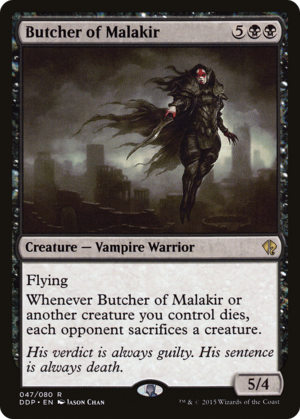
Card Details
Info
| Color: | |
| Identifies: | |
| Cost: |
|
| Rarity: | Rare |
| Converted Cost: | 7 |
| Power/Toughness: | 5/4 |
| Types: | |
| SubTypes: | |
| Languages: | 
         |
| Layout: | Normal |
| Rank: | |
| Saltiness: |
Abilities/Keywords
Rules
Text
Flying Whenever this creature or another creature you control dies, each opponent sacrifices a creature of their choice.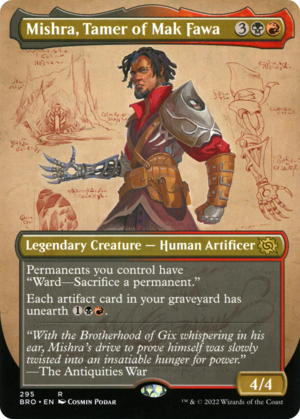
Card Details
Info
| Color: | |
| Identifies: | |
| Cost: |
|
| Rarity: | Rare |
| Converted Cost: | 5 |
| Power/Toughness: | 4/4 |
| Types: | |
| SubTypes: | |
| Languages: | 
       |
| Layout: | Normal |
| Rank: | |
| Saltiness: |
Rules
Prices
Legalities
Standard
Standardbrawl
Vintage
Modern
Brawl
Historic
Duel
Alchemy
Predh
Oathbreaker
Commander
Pioneer
Oldschool
Timeless
Premodern
Penny
Pauper
Gladiator
Paupercommander
Future
Legacy
Text
Permanents you control have "Ward—Sacrifice a permanent." Each artifact card in your graveyard has unearth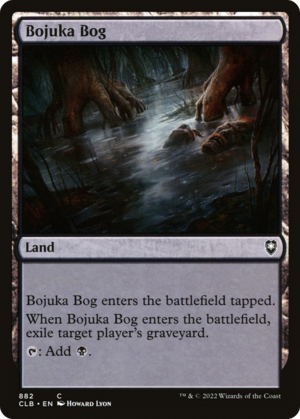
Card Details
Info
| Color: | |
| Identifies: | |
| Cost: | |
| Rarity: | Common |
| Converted Cost: | 0 |
| Power/Toughness: | / |
| Types: | |
| SubTypes: | |
| Languages: | 
         |
| Layout: | Normal |
| Rank: | |
| Saltiness: |
Rules
Prices
Legalities
Standard
Standardbrawl
Vintage
Modern
Brawl
Historic
Duel
Alchemy
Predh
Oathbreaker
Commander
Pioneer
Oldschool
Timeless
Premodern
Penny
Pauper
Gladiator
Paupercommander
Future
Legacy
Text
This land enters tapped. When this land enters, exile target player's graveyard.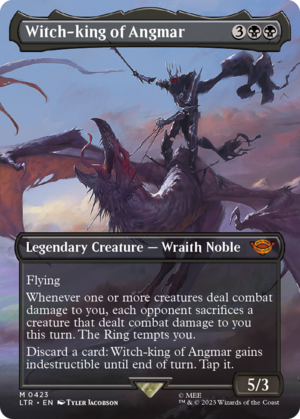
Card Details
Info
| Color: | |
| Identifies: | |
| Cost: |
|
| Rarity: | Mythic |
| Converted Cost: | 5 |
| Power/Toughness: | 5/3 |
| Types: | |
| SubTypes: | |
| Languages: | 
       |
| Layout: | Normal |
| Rank: | |
| Saltiness: | |
| Tokens: |
Abilities/Keywords
Rules
Prices
Legalities
Standard
Standardbrawl
Vintage
Modern
Brawl
Historic
Duel
Alchemy
Predh
Oathbreaker
Commander
Pioneer
Oldschool
Timeless
Premodern
Penny
Pauper
Gladiator
Paupercommander
Future
Legacy
Text
Flying Whenever one or more creatures deal combat damage to you, each opponent sacrifices a creature of their choice that dealt combat damage to you this turn. The Ring tempts you. Discard a card: Witch-king of Angmar gains indestructible until end of turn. Tap it.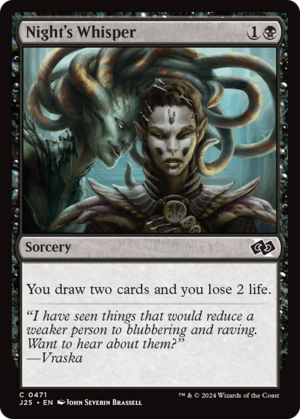
Card Details
Info
| Color: | |
| Identifies: | |
| Cost: |
|
| Rarity: | Common |
| Converted Cost: | 2 |
| Power/Toughness: | / |
| Types: | |
| SubTypes: | |
| Languages: | 
         |
| Layout: | Normal |
| Rank: | |
| Saltiness: |
Rules
Text
You draw two cards and lose 2 life.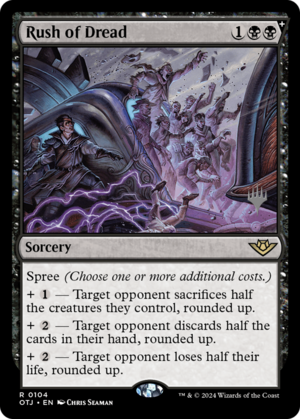
Card Details
Info
| Color: | |
| Identifies: | |
| Cost: |
|
| Rarity: | Rare |
| Converted Cost: | 3 |
| Power/Toughness: | / |
| Types: | |
| SubTypes: | |
| Languages: | 
       |
| Layout: | Normal |
| Rank: | |
| Saltiness: |
Abilities/Keywords
Rules
Prices
Legalities
Standard
Standardbrawl
Vintage
Modern
Brawl
Historic
Duel
Alchemy
Predh
Oathbreaker
Commander
Pioneer
Oldschool
Timeless
Premodern
Penny
Pauper
Gladiator
Paupercommander
Future
Legacy
Text
Spree (Choose one or more additional costs.) +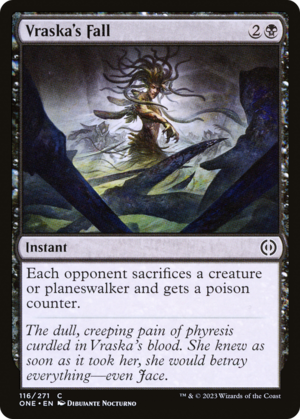
Card Details
Info
| Color: | |
| Identifies: | |
| Cost: |
|
| Rarity: | Common |
| Converted Cost: | 3 |
| Power/Toughness: | / |
| Types: | |
| SubTypes: | |
| Languages: | 
       |
| Layout: | Normal |
| Rank: | |
| Saltiness: | |
| Tokens: |
Rules
Prices
Legalities
Standard
Standardbrawl
Vintage
Modern
Brawl
Historic
Duel
Alchemy
Predh
Oathbreaker
Commander
Pioneer
Oldschool
Timeless
Premodern
Penny
Pauper
Gladiator
Paupercommander
Future
Legacy
Text
Each opponent sacrifices a creature or planeswalker of their choice and gets a poisoncounter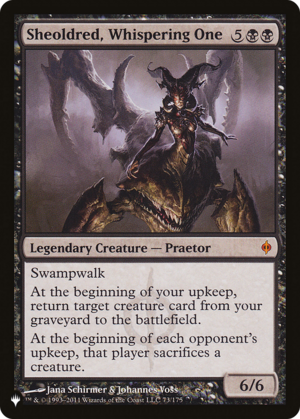
Card Details
Info
| Color: | |
| Identifies: | |
| Cost: |
|
| Rarity: | Mythic |
| Converted Cost: | 7 |
| Power/Toughness: | 6/6 |
| Types: | |
| SubTypes: | |
| Languages: | 
         |
| Layout: | Normal |
| Rank: | |
| Saltiness: |
Abilities/Keywords
Rules
Text
Swampwalk (This creature can't be blocked as long as defending player controls a Swamp.) At the beginning of your upkeep, return target creature card from your graveyard to the battlefield. At the beginning of each opponent's upkeep, that player sacrifices a creature of their choice.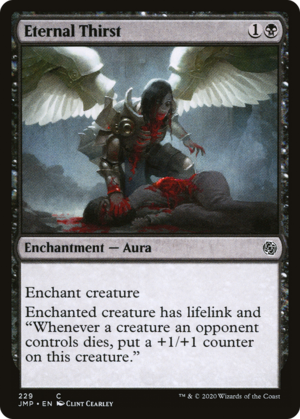
Card Details
Info
| Color: | |
| Identifies: | |
| Cost: |
|
| Rarity: | Common |
| Converted Cost: | 2 |
| Power/Toughness: | / |
| Types: | |
| SubTypes: | |
| Languages: | 
          |
| Layout: | Normal |
| Rank: | |
| Saltiness: |
Abilities/Keywords
Rules
Text
Enchant creature Enchanted creature has lifelink and "Whenever a creature an opponent controls dies, put a +1/+1counteron this creature." (Damage dealt by a creature with lifelink also causes its controller to gain that much life.)
Card Details
Info
| Color: | |
| Identifies: | |
| Cost: |
|
| Rarity: | Common |
| Converted Cost: | 2 |
| Power/Toughness: | / |
| Types: | |
| SubTypes: | |
| Languages: | 
          |
| Layout: | Normal |
| Rank: | |
| Saltiness: |
Rules
Text
Target player draws two cards and loses 2 life.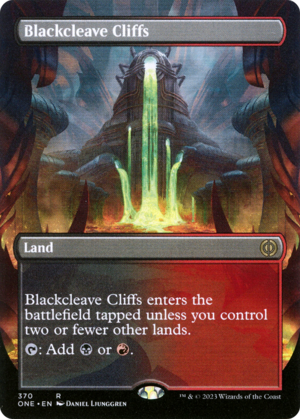
Card Details
Info
| Color: | |
| Identifies: | |
| Cost: | |
| Rarity: | Rare |
| Converted Cost: | 0 |
| Power/Toughness: | / |
| Types: | |
| SubTypes: | |
| Languages: | 
          |
| Layout: | Normal |
| Rank: | |
| Saltiness: |
Rules
Prices
Legalities
Standard
Standardbrawl
Vintage
Modern
Brawl
Historic
Duel
Alchemy
Predh
Oathbreaker
Commander
Pioneer
Oldschool
Timeless
Premodern
Penny
Pauper
Gladiator
Paupercommander
Future
Legacy
Text
This land enters tapped unless you control two or fewer other lands.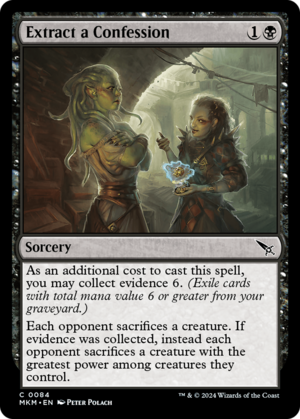
Card Details
Info
| Color: | |
| Identifies: | |
| Cost: |
|
| Rarity: | Common |
| Converted Cost: | 2 |
| Power/Toughness: | / |
| Types: | |
| SubTypes: | |
| Languages: | 
       |
| Layout: | Normal |
| Rank: | |
| Saltiness: |
Abilities/Keywords
Rules
Prices
Legalities
Standard
Standardbrawl
Vintage
Modern
Brawl
Historic
Duel
Alchemy
Predh
Oathbreaker
Commander
Pioneer
Oldschool
Timeless
Premodern
Penny
Pauper
Gladiator
Paupercommander
Future
Legacy
Text
As an additional cost to cast this spell, you may collect evidence 6. (Exile cards with total mana value 6 or greater from your graveyard.) Each opponent sacrifices a creature of their choice. If evidence was collected, instead each opponent sacrifices a creature with the greatest power among creatures they control.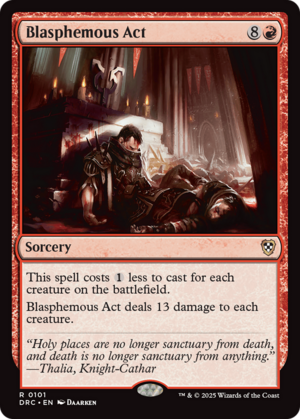
Card Details
Info
| Color: | |
| Identifies: | |
| Cost: |
|
| Rarity: | Rare |
| Converted Cost: | 9 |
| Power/Toughness: | / |
| Types: | |
| SubTypes: | |
| Languages: | 
          |
| Layout: | Normal |
| Rank: | |
| Saltiness: |
Rules
Text
This spell costs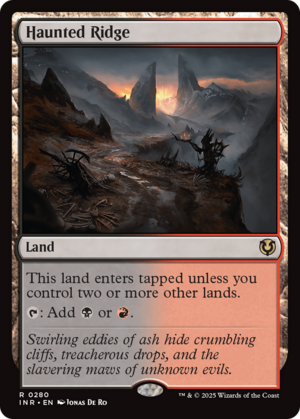
Card Details
Info
| Color: | |
| Identifies: | |
| Cost: | |
| Rarity: | Rare |
| Converted Cost: | 0 |
| Power/Toughness: | / |
| Types: | |
| SubTypes: | |
| Languages: | 
          |
| Layout: | Normal |
| Rank: | |
| Saltiness: |
Rules
Prices
Legalities
Standard
Standardbrawl
Vintage
Modern
Brawl
Historic
Duel
Alchemy
Predh
Oathbreaker
Commander
Pioneer
Oldschool
Timeless
Premodern
Penny
Pauper
Gladiator
Paupercommander
Future
Legacy
Text
This land enters tapped unless you control two or more other lands.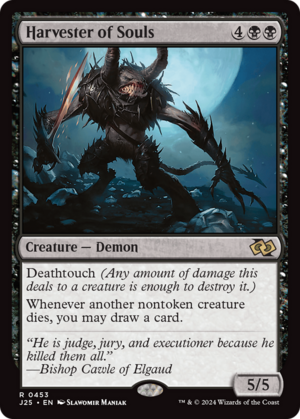
Card Details
Info
| Color: | |
| Identifies: | |
| Cost: |
|
| Rarity: | Rare |
| Converted Cost: | 6 |
| Power/Toughness: | 5/5 |
| Types: | |
| SubTypes: | |
| Languages: | 
          |
| Layout: | Normal |
| Rank: | |
| Saltiness: |
Abilities/Keywords
Rules
Text
Deathtouch (Any amount of damage this deals to a creature is enough todestroyit.) Whenever another nontoken creature dies, you may draw a card.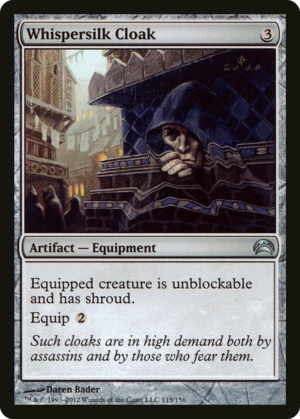
Card Details
Info
| Color: | |
| Identifies: | |
| Cost: |
|
| Rarity: | Uncommon |
| Converted Cost: | 3 |
| Power/Toughness: | / |
| Types: | |
| SubTypes: | |
| Languages: | 
         |
| Layout: | Normal |
| Rank: | |
| Saltiness: |
Abilities/Keywords
Rules
Text
Equipped creature can't be blocked and has shroud. (It can't be the target of spells or abilities.) Equip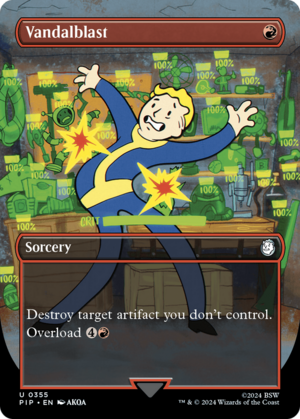
Card Details
Info
| Color: | |
| Identifies: | |
| Cost: |
|
| Rarity: | Uncommon |
| Converted Cost: | 1 |
| Power/Toughness: | / |
| Types: | |
| SubTypes: | |
| Languages: | 
          |
| Layout: | Normal |
| Rank: | |
| Saltiness: |
Abilities/Keywords
Rules
Prices
Legalities
Standard
Standardbrawl
Vintage
Modern
Brawl
Historic
Duel
Alchemy
Predh
Oathbreaker
Commander
Pioneer
Oldschool
Timeless
Premodern
Penny
Pauper
Gladiator
Paupercommander
Future
Legacy
Text
Destroy target artifact you don't control. Overload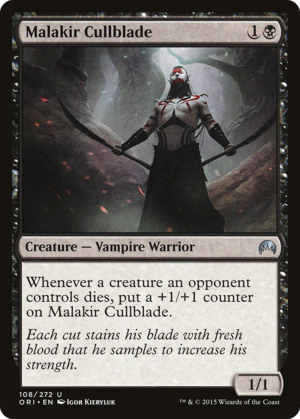
Card Details
Info
| Color: | |
| Identifies: | |
| Cost: |
|
| Rarity: | Uncommon |
| Converted Cost: | 2 |
| Power/Toughness: | 1/1 |
| Types: | |
| SubTypes: | |
| Languages: | 
          |
| Layout: | Normal |
| Rank: | |
| Saltiness: |
Rules
Prices
Legalities
Standard
Standardbrawl
Vintage
Modern
Brawl
Historic
Duel
Alchemy
Predh
Oathbreaker
Commander
Pioneer
Oldschool
Timeless
Premodern
Penny
Pauper
Gladiator
Paupercommander
Future
Legacy
Text
Whenever a creature an opponent controls dies, put a +1/+1counteron this creature.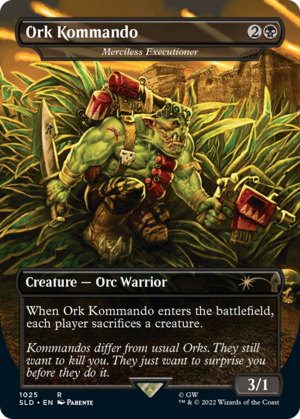
Card Details
Info
| Color: | |
| Identifies: | |
| Cost: |
|
| Rarity: | Rare |
| Converted Cost: | 3 |
| Power/Toughness: | 3/1 |
| Types: | |
| SubTypes: | |
| Languages: | 
          |
| Layout: | Normal |
| Rank: | |
| Saltiness: |
Rules
Prices
Legalities
Standard
Standardbrawl
Vintage
Modern
Brawl
Historic
Duel
Alchemy
Predh
Oathbreaker
Commander
Pioneer
Oldschool
Timeless
Premodern
Penny
Pauper
Gladiator
Paupercommander
Future
Legacy
Text
When this creature enters, each player sacrifices a creature of their choice.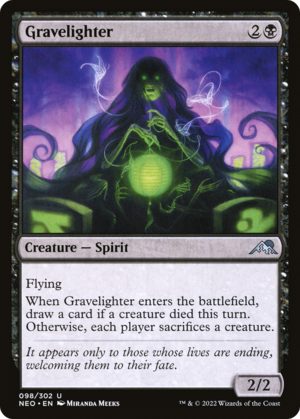
Card Details
Info
| Color: | |
| Identifies: | |
| Cost: |
|
| Rarity: | Uncommon |
| Converted Cost: | 3 |
| Power/Toughness: | 2/2 |
| Types: | |
| SubTypes: | |
| Languages: | 
          |
| Layout: | Normal |
| Rank: | |
| Saltiness: |
Abilities/Keywords
Rules
Prices
Legalities
Standard
Standardbrawl
Vintage
Modern
Brawl
Historic
Duel
Alchemy
Predh
Oathbreaker
Commander
Pioneer
Oldschool
Timeless
Premodern
Penny
Pauper
Gladiator
Paupercommander
Future
Legacy
Text
Flying When this creature enters, draw a card if a creature died this turn. Otherwise, each player sacrifices a creature of their choice.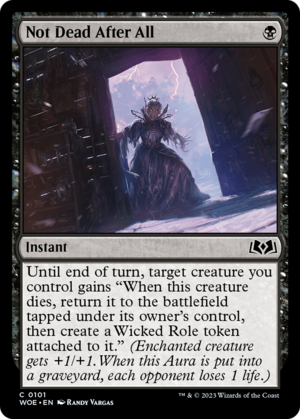
Card Details
Info
| Color: | |
| Identifies: | |
| Cost: |
|
| Rarity: | Common |
| Converted Cost: | 1 |
| Power/Toughness: | / |
| Types: | |
| SubTypes: | |
| Languages: | 
       |
| Layout: | Normal |
| Rank: | |
| Saltiness: | |
| Tokens: |
Abilities/Keywords
Rules
Prices
Legalities
Standard
Standardbrawl
Vintage
Modern
Brawl
Historic
Duel
Alchemy
Predh
Oathbreaker
Commander
Pioneer
Oldschool
Timeless
Premodern
Penny
Pauper
Gladiator
Paupercommander
Future
Legacy
Text
Until end of turn, target creature you control gains "When this creature dies, return it to the battlefield tapped under its owner's control, then create a Wicked Role token attached to it." (Enchanted creature gets +1/+1. When this token is put into a graveyard, each opponent loses 1 life.)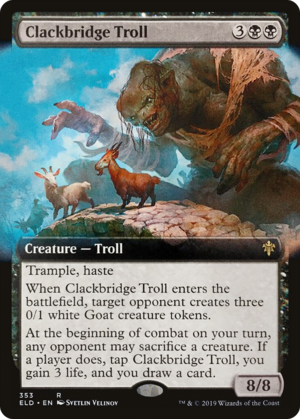
Card Details
Info
| Color: | |
| Identifies: | |
| Cost: |
|
| Rarity: | Rare |
| Converted Cost: | 5 |
| Power/Toughness: | 8/8 |
| Types: | |
| SubTypes: | |
| Languages: | 
          |
| Layout: | Normal |
| Rank: | |
| Saltiness: | |
| Tokens: |
Abilities/Keywords
Rules
Prices
Legalities
Standard
Standardbrawl
Vintage
Modern
Brawl
Historic
Duel
Alchemy
Predh
Oathbreaker
Commander
Pioneer
Oldschool
Timeless
Premodern
Penny
Pauper
Gladiator
Paupercommander
Future
Legacy
Text
Trample, haste When this creature enters, target opponent creates three 0/1 white Goat creature tokens. At the beginning of combat on your turn, any opponent maysacrificea creature of their choice. If a player does, tap this creature, you gain 3 life, and you draw a card.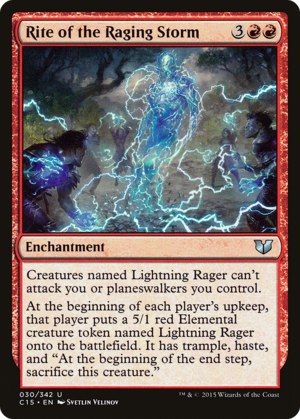
Card Details
Info
| Color: | |
| Identifies: | |
| Cost: |
|
| Rarity: | Uncommon |
| Converted Cost: | 5 |
| Power/Toughness: | / |
| Types: | |
| SubTypes: | |
| Languages: | 
         |
| Layout: | Normal |
| Rank: | |
| Saltiness: | |
| Tokens: |
Rules
Text
Creatures named Lightning Rager can't attack you or planeswalkers you control. At the beginning of each player's upkeep, that player creates a 5/1 red Elemental creature token named Lightning Rager. It has trample, haste, and "At the beginning of the end step,sacrificethis token."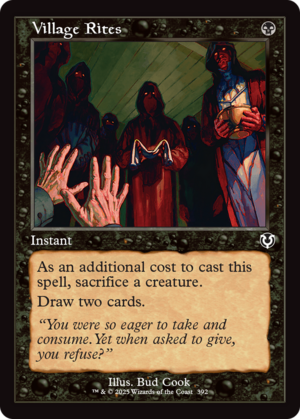
Card Details
Info
| Color: | |
| Identifies: | |
| Cost: |
|
| Rarity: | Common |
| Converted Cost: | 1 |
| Power/Toughness: | / |
| Types: | |
| SubTypes: | |
| Languages: | 
          |
| Layout: | Normal |
| Rank: | |
| Saltiness: |
Rules
Prices
Legalities
Standard
Standardbrawl
Vintage
Modern
Brawl
Historic
Duel
Alchemy
Predh
Oathbreaker
Commander
Pioneer
Oldschool
Timeless
Premodern
Penny
Pauper
Gladiator
Paupercommander
Future
Legacy
Text
As an additional cost to cast this spell,sacrificea creature. Draw two cards.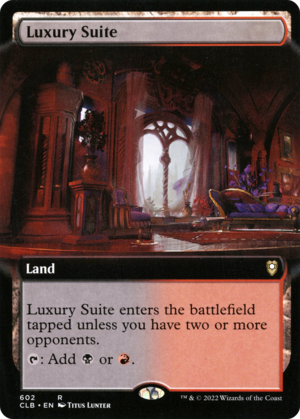
Card Details
Info
| Color: | |
| Identifies: | |
| Cost: | |
| Rarity: | Rare |
| Converted Cost: | 0 |
| Power/Toughness: | / |
| Types: | |
| SubTypes: | |
| Languages: | 
          |
| Layout: | Normal |
| Rank: | |
| Saltiness: |
Rules
Prices
Legalities
Standard
Standardbrawl
Vintage
Modern
Brawl
Historic
Duel
Alchemy
Predh
Oathbreaker
Commander
Pioneer
Oldschool
Timeless
Premodern
Penny
Pauper
Gladiator
Paupercommander
Future
Legacy
Text
This land enters tapped unless you have two or more opponents.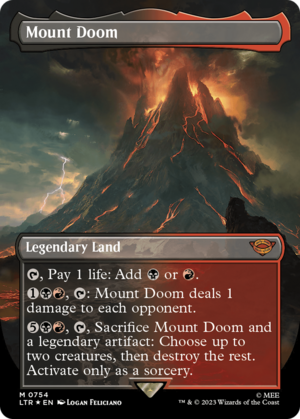
Card Details
Info
| Color: | |
| Identifies: | |
| Cost: | |
| Rarity: | Mythic |
| Converted Cost: | 0 |
| Power/Toughness: | / |
| Types: | |
| SubTypes: | |
| Languages: | 
       |
| Layout: | Normal |
| Rank: | |
| Saltiness: |
Rules
Text
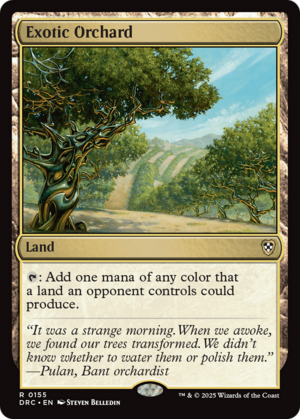
Card Details
Info
| Color: | |
| Identifies: | |
| Cost: | |
| Rarity: | Rare |
| Converted Cost: | 0 |
| Power/Toughness: | / |
| Types: | |
| SubTypes: | |
| Languages: | 
         |
| Layout: | Normal |
| Rank: | |
| Saltiness: |
Rules
Text
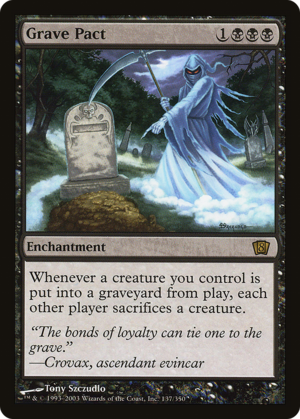
Card Details
Info
| Color: | |
| Identifies: | |
| Cost: |
|
| Rarity: | Rare |
| Converted Cost: | 4 |
| Power/Toughness: | / |
| Types: | |
| SubTypes: | |
| Languages: | 
        |
| Layout: | Normal |
| Rank: | |
| Saltiness: |
Rules
Prices
| Seller | Price |
|---|---|
| Tcgplayer | 24.7 USD / 176.79 USD |
| Manapool | 79.38 USD |
Legalities
Standard
Standardbrawl
Vintage
Modern
Brawl
Historic
Duel
Alchemy
Predh
Oathbreaker
Commander
Pioneer
Oldschool
Timeless
Premodern
Penny
Pauper
Gladiator
Paupercommander
Future
Legacy
Text
Whenever a creature you control dies, each other player sacrifices a creature of their choice.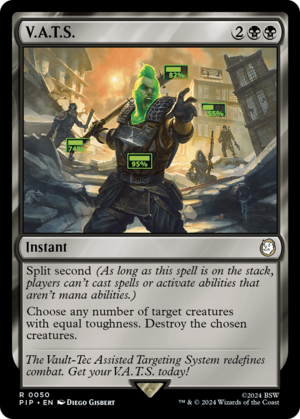
Card Details
Info
| Color: | |
| Identifies: | |
| Cost: |
|
| Rarity: | Rare |
| Converted Cost: | 4 |
| Power/Toughness: | / |
| Types: | |
| SubTypes: | |
| Languages: | 
      |
| Layout: | Normal |
| Rank: | |
| Saltiness: |
Abilities/Keywords
Rules
Prices
Legalities
Standard
Standardbrawl
Vintage
Modern
Brawl
Historic
Duel
Alchemy
Predh
Oathbreaker
Commander
Pioneer
Oldschool
Timeless
Premodern
Penny
Pauper
Gladiator
Paupercommander
Future
Legacy
Text
Split second (As long as this spell is on the stack, players can't cast spells or activate abilities that aren't mana abilities.) Choose any number of target creatures with equal toughness.Destroythe chosen creatures.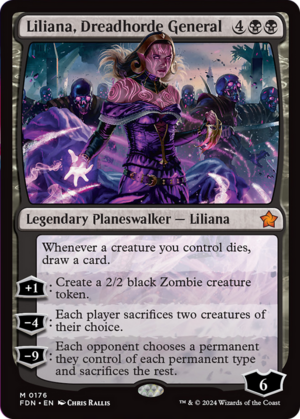
Card Details
Info
| Color: | |
| Identifies: | |
| Cost: |
|
| Rarity: | Mythic |
| Converted Cost: | 6 |
| Power/Toughness: | / |
| Types: | |
| SubTypes: | |
| Languages: | 
          |
| Layout: | Normal |
| Rank: | |
| Saltiness: | |
| Tokens: |
Rules
Prices
Legalities
Standard
Standardbrawl
Vintage
Modern
Brawl
Historic
Duel
Alchemy
Predh
Oathbreaker
Commander
Pioneer
Oldschool
Timeless
Premodern
Penny
Pauper
Gladiator
Paupercommander
Future
Legacy
Text
Whenever a creature you control dies, draw a card.+1 Create a 2/2 black Zombie creature token.
−4 Each player sacrifices two creatures of their choice.
−9 Each opponent chooses a permanent they control of each permanent type and sacrifices the rest.
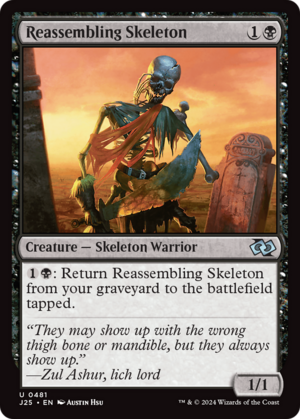
Card Details
Info
| Color: | |
| Identifies: | |
| Cost: |
|
| Rarity: | Uncommon |
| Converted Cost: | 2 |
| Power/Toughness: | 1/1 |
| Types: | |
| SubTypes: | |
| Languages: | 
          |
| Layout: | Normal |
| Rank: | |
| Saltiness: |
Rules
Text
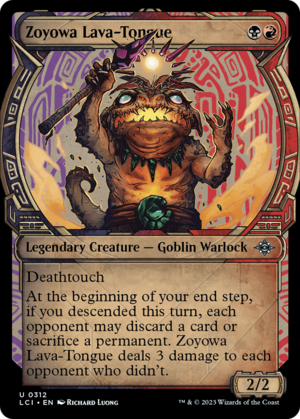
Card Details
Info
| Color: | |
| Identifies: | |
| Cost: |
|
| Rarity: | Uncommon |
| Converted Cost: | 2 |
| Power/Toughness: | 2/2 |
| Types: | |
| SubTypes: | |
| Languages: | 
       |
| Layout: | Normal |
| Rank: | |
| Saltiness: |
Abilities/Keywords
Rules
Prices
Legalities
Standard
Standardbrawl
Vintage
Modern
Brawl
Historic
Duel
Alchemy
Predh
Oathbreaker
Commander
Pioneer
Oldschool
Timeless
Premodern
Penny
Pauper
Gladiator
Paupercommander
Future
Legacy
Text
Deathtouch At the beginning of your end step, if you descended this turn, each opponent maydiscarda card orsacrificea permanent of their choice. Zoyowa deals 3 damage to each opponent who didn't. (You descended if a permanent card was put into your graveyard from anywhere.)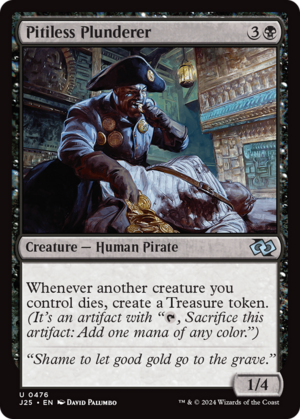
Card Details
Info
| Color: | |
| Identifies: | |
| Cost: |
|
| Rarity: | Uncommon |
| Converted Cost: | 4 |
| Power/Toughness: | 1/4 |
| Types: | |
| SubTypes: | |
| Languages: | 
          |
| Layout: | Normal |
| Rank: | |
| Saltiness: | |
| Tokens: |
Abilities/Keywords
Rules
Text
Whenever another creature you control dies, create a Treasure token. (It's an artifact with "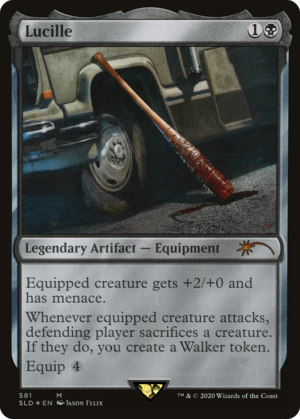
Card Details
Info
| Color: | |
| Identifies: | |
| Cost: |
|
| Rarity: | Mythic |
| Converted Cost: | 2 |
| Power/Toughness: | / |
| Types: | |
| SubTypes: | |
| Languages: | 
|
| Layout: | Normal |
| Rank: | |
| Saltiness: | |
| Tokens: |
Abilities/Keywords
Rules
Prices
Legalities
Standard
Standardbrawl
Vintage
Modern
Brawl
Historic
Duel
Alchemy
Predh
Oathbreaker
Commander
Pioneer
Oldschool
Timeless
Premodern
Penny
Pauper
Gladiator
Paupercommander
Future
Legacy
Text
Equipped creature gets +2/+0 and has menace. Whenever equipped creature attacks, defending player sacrifices a creature of their choice. If they do, you create a Walker token. Equip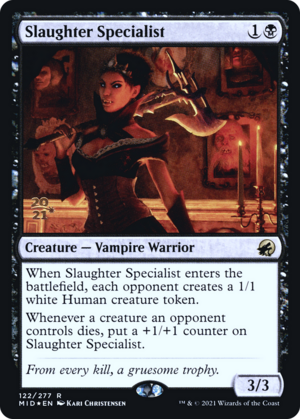
Card Details
Info
| Color: | |
| Identifies: | |
| Cost: |
|
| Rarity: | Rare |
| Converted Cost: | 2 |
| Power/Toughness: | 3/3 |
| Types: | |
| SubTypes: | |
| Languages: | 
     |
| Layout: | Normal |
| Rank: | |
| Saltiness: | |
| Tokens: |
Rules
Text
When this creature enters, each opponent creates a 1/1 white Human creature token. Whenever a creature an opponent controls dies, put a +1/+1counteron this creature.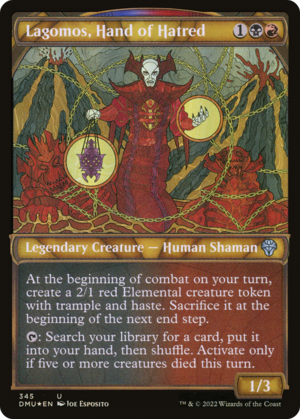
Card Details
Info
| Color: | |
| Identifies: | |
| Cost: |
|
| Rarity: | Uncommon |
| Converted Cost: | 3 |
| Power/Toughness: | 1/3 |
| Types: | |
| SubTypes: | |
| Languages: | 
       |
| EDH Bracket Attr: | Tutors |
| Layout: | Normal |
| Rank: | |
| Saltiness: | |
| Tokens: |
Rules
Prices
Legalities
Standard
Standardbrawl
Vintage
Modern
Brawl
Historic
Duel
Alchemy
Predh
Oathbreaker
Commander
Pioneer
Oldschool
Timeless
Premodern
Penny
Pauper
Gladiator
Paupercommander
Future
Legacy
Text
At the beginning of combat on your turn, create a 2/1 red Elemental creature token with trample and haste.Sacrificeit at the beginning of the next end step.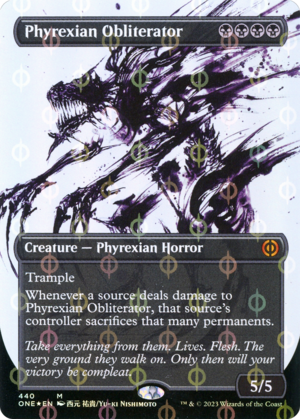
Card Details
Info
| Color: | |
| Identifies: | |
| Cost: |
|
| Rarity: | Mythic |
| Converted Cost: | 4 |
| Power/Toughness: | 5/5 |
| Types: | |
| SubTypes: | |
| Languages: | 
         |
| Layout: | Normal |
| Rank: | |
| Saltiness: |
Abilities/Keywords
Rules
Text
Trample Whenever a source deals damage to this creature, that source's controller sacrifices that many permanents of their choice.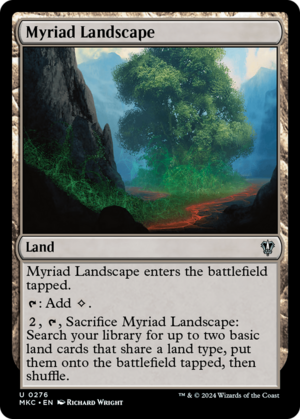
Card Details
Info
| Color: | |
| Identifies: | |
| Cost: | |
| Rarity: | Uncommon |
| Converted Cost: | 0 |
| Power/Toughness: | / |
| Types: | |
| SubTypes: | |
| Languages: | 
         |
| Layout: | Normal |
| Rank: | |
| Saltiness: |
Rules
Prices
Legalities
Standard
Standardbrawl
Vintage
Modern
Brawl
Historic
Duel
Alchemy
Predh
Oathbreaker
Commander
Pioneer
Oldschool
Timeless
Premodern
Penny
Pauper
Gladiator
Paupercommander
Future
Legacy
Text
This land enters tapped.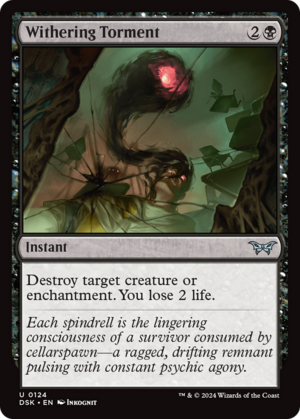
Card Details
Info
| Color: | |
| Identifies: | |
| Cost: |
|
| Rarity: | Uncommon |
| Converted Cost: | 3 |
| Power/Toughness: | / |
| Types: | |
| SubTypes: | |
| Languages: | 
     |
| Layout: | Normal |
| Rank: | |
| Saltiness: |
Rules
Prices
Legalities
Standard
Standardbrawl
Vintage
Modern
Brawl
Historic
Duel
Alchemy
Predh
Oathbreaker
Commander
Pioneer
Oldschool
Timeless
Premodern
Penny
Pauper
Gladiator
Paupercommander
Future
Legacy
Text
Destroy target creature or enchantment. You lose 2 life.
Card Details
Info
| Color: | |
| Identifies: | |
| Cost: |
|
| Rarity: | Rare |
| Converted Cost: | 4 |
| Power/Toughness: | 2/2 |
| Types: | |
| SubTypes: | |
| Languages: | 
          |
| Layout: | Normal |
| Rank: | |
| Saltiness: |
Rules
Text
When this creature enters, you may search your library for a basic land card, put that card onto the battlefield tapped, thenshuffle When this creature dies, you may draw a card.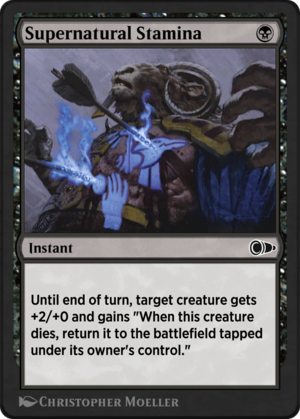
Card Details
Info
| Color: | |
| Identifies: | |
| Cost: |
|
| Rarity: | Common |
| Converted Cost: | 1 |
| Power/Toughness: | / |
| Types: | |
| SubTypes: | |
| Languages: | 
          |
| Layout: | Normal |
| Rank: | |
| Saltiness: |
Rules
Prices
| Seller | Price |
|---|
Legalities
Standard
Standardbrawl
Vintage
Modern
Brawl
Historic
Duel
Alchemy
Predh
Oathbreaker
Commander
Pioneer
Oldschool
Timeless
Premodern
Penny
Pauper
Gladiator
Paupercommander
Future
Legacy
Text
Until end of turn, target creature gets +2/+0 and gains "When this creature dies, return it to the battlefield tapped under its owner's control."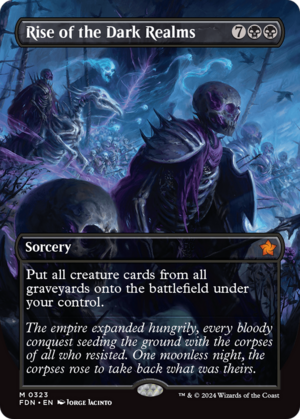
Card Details
Info
| Color: | |
| Identifies: | |
| Cost: |
|
| Rarity: | Mythic |
| Converted Cost: | 9 |
| Power/Toughness: | / |
| Types: | |
| SubTypes: | |
| Languages: | 
          |
| Layout: | Normal |
| Rank: | |
| Saltiness: |
Rules
Prices
Legalities
Standard
Standardbrawl
Vintage
Modern
Brawl
Historic
Duel
Alchemy
Predh
Oathbreaker
Commander
Pioneer
Oldschool
Timeless
Premodern
Penny
Pauper
Gladiator
Paupercommander
Future
Legacy
Text
Put all creature cards from all graveyards onto the battlefield under your control.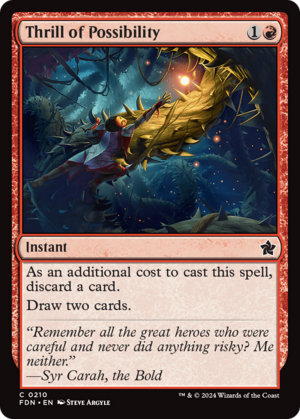
Card Details
Info
| Color: | |
| Identifies: | |
| Cost: |
|
| Rarity: | Common |
| Converted Cost: | 2 |
| Power/Toughness: | / |
| Types: | |
| SubTypes: | |
| Languages: | 
          |
| Layout: | Normal |
| Rank: | |
| Saltiness: |
Rules
Prices
Legalities
Standard
Standardbrawl
Vintage
Modern
Brawl
Historic
Duel
Alchemy
Predh
Oathbreaker
Commander
Pioneer
Oldschool
Timeless
Premodern
Penny
Pauper
Gladiator
Paupercommander
Future
Legacy
Text
As an additional cost to cast this spell,discarda card. Draw two cards.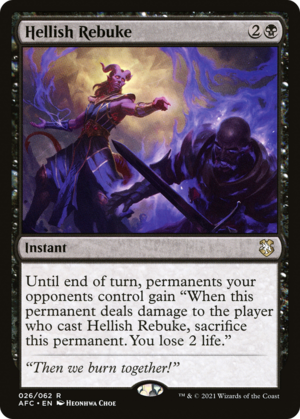
Card Details
Info
| Color: | |
| Identifies: | |
| Cost: |
|
| Rarity: | Rare |
| Converted Cost: | 3 |
| Power/Toughness: | / |
| Types: | |
| SubTypes: | |
| Languages: | 
         |
| Layout: | Normal |
| Rank: | |
| Saltiness: |
Rules
Text
Until end of turn, permanents your opponents control gain "When this permanent deals damage to the player who cast Hellish Rebuke,sacrificethis permanent. You lose 2 life."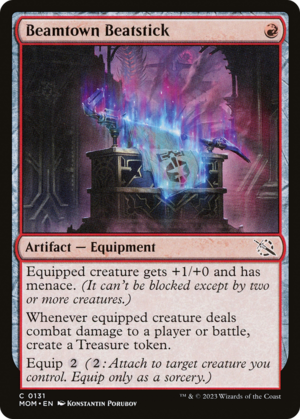
Card Details
Info
| Color: | |
| Identifies: | |
| Cost: |
|
| Rarity: | Common |
| Converted Cost: | 1 |
| Power/Toughness: | / |
| Types: | |
| SubTypes: | |
| Languages: | 
       |
| Layout: | Normal |
| Rank: | |
| Saltiness: | |
| Tokens: |
Abilities/Keywords
Rules
Prices
Legalities
Standard
Standardbrawl
Vintage
Modern
Brawl
Historic
Duel
Alchemy
Predh
Oathbreaker
Commander
Pioneer
Oldschool
Timeless
Premodern
Penny
Pauper
Gladiator
Paupercommander
Future
Legacy
Text
Equipped creature gets +1/+0 and has menace. (It can't be blocked except by two or more creatures.) Whenever equipped creature deals combat damage to a player or battle, create a Treasure token. Equip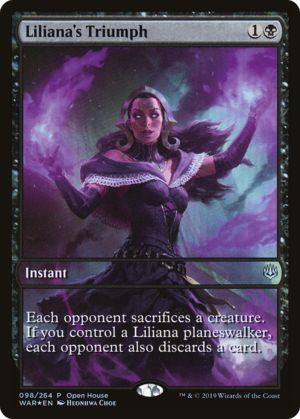
Card Details
Info
| Color: | |
| Identifies: | |
| Cost: |
|
| Rarity: | Uncommon |
| Converted Cost: | 2 |
| Power/Toughness: | / |
| Types: | |
| SubTypes: | |
| Languages: | 
          |
| Layout: | Normal |
| Rank: | |
| Saltiness: |
Rules
Text
Each opponent sacrifices a creature of their choice. If you control a Liliana planeswalker, each opponent also discards a card.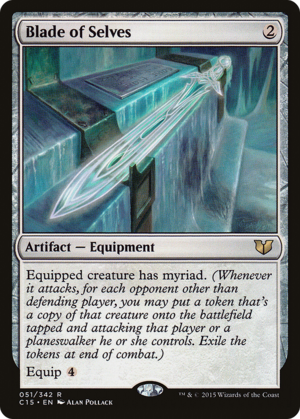
Card Details
Info
| Color: | |
| Identifies: | |
| Cost: |
|
| Rarity: | Rare |
| Converted Cost: | 2 |
| Power/Toughness: | / |
| Types: | |
| SubTypes: | |
| Languages: | 
      |
| Layout: | Normal |
| Rank: | |
| Saltiness: | |
| Tokens: |
Abilities/Keywords
Rules
Prices
Legalities
Standard
Standardbrawl
Vintage
Modern
Brawl
Historic
Duel
Alchemy
Predh
Oathbreaker
Commander
Pioneer
Oldschool
Timeless
Premodern
Penny
Pauper
Gladiator
Paupercommander
Future
Legacy
Text
Equipped creature has myriad. (Whenever it attacks, for each opponent other than defending player, you may create a token copy that's tapped and attacking that player or a planeswalker they control. Exile the tokens at end of combat.) Equip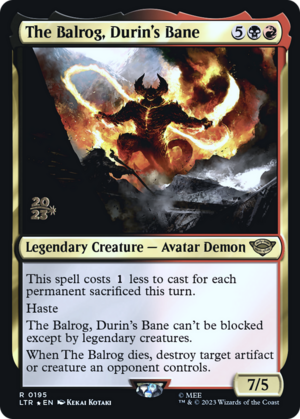
Card Details
Info
| Color: | |
| Identifies: | |
| Cost: |
|
| Rarity: | Rare |
| Converted Cost: | 7 |
| Power/Toughness: | 7/5 |
| Types: | |
| SubTypes: | |
| Languages: | 
|
| Layout: | Normal |
| Rank: | |
| Saltiness: |
Abilities/Keywords
Rules
Text
This spell costs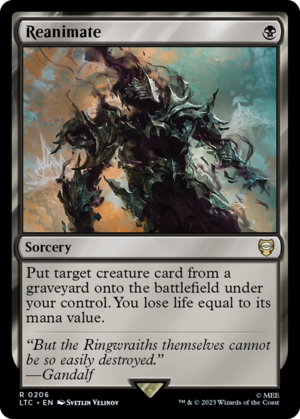
Card Details
Info
| Color: | |
| Identifies: | |
| Cost: |
|
| Rarity: | Rare |
| Converted Cost: | 1 |
| Power/Toughness: | / |
| Types: | |
| SubTypes: | |
| Languages: | 
       |
| Layout: | Normal |
| Rank: | |
| Saltiness: |
Rules
Prices
Legalities
Standard
Standardbrawl
Vintage
Modern
Brawl
Historic
Duel
Alchemy
Predh
Oathbreaker
Commander
Pioneer
Oldschool
Timeless
Premodern
Penny
Pauper
Gladiator
Paupercommander
Future
Legacy